
Ulli Diemer — Radical Digressions
Blogs & Notes
- Notebooks: 11 - 10 - 9 - 8 - 7 - 6 - 5 - 4 - 3 - 2 - 1
- Latest Post
- Moments
- Quotes & Fragments
- Scrapbook
- People
Articles Lists
- Selected Articles
- Articles in English
- Articles in French
- Articles in Spanish
- Articles in German
- Articles in Other Languages
- Articles A-Z
- Subject Index

Compilations & Resources
- Connexions
- Other Voices newsletter
- Seeds of Fire
- Alternative Media List
- Manifestos & Visions
- Marxism page
- Socialism page
- Organizing Resources
- People’s History, Memory, Archives
- Connexions Quotations page
- Sources
- What I’ve been reading
- What I’ve been watching
Selected Articles
- The main enemy is at home
- Terry Fox & the Marathon of Hope
- Intelligence of Ravens
- Faith, Hope and Persistence
- Massacres and Morality
- Karl Marx
- Rosa Luxemburg
- Medicare Myths and Realities
- One Vote for Democracy
- Dances with Guilt: Looking at Men Looking at Violence
- Neoliberalism and state capitalism
- National Post columnist traumatized by having to wait his turn
- Free speech” – as long as it doesn’t offend anyone
- Inclusion or exclusion?
- Let’s Stop Kidding Ourselves About the NDP
- My politics in brief
- Abandoning the public interest
- On Self-Determination
- Contamination: The Poisonous Legacy of Ontario’s Environmental Cutbacks
- More Articles...
Selected Topics
- Alternative Media
- Bullshit
- Censorship
- Chess
- Civil Liberties
- Collective Memory
- Community Organizing
- Consensus Decision-making
- Democratization
- Double Standards
- Drinking Water
- Free Speech
- Health Care
- History
- Identity Politics
- Interviews & Conversations
- Israel/Palestine
- Libertarian Socialism
- Marxism
- Men’s Issues
- Moments
- Nature
- Neo-Liberalism
- New Democratic Party (NDP)
- Obituaries & Tributes
- Political Humour/Satire
- Public Safety
- Self-Determination
- Socialism
- Revolution
Radical Digressions
Ulli Diemer’s Notebook #10
Nature Calendar January: Woodpecker
January 1, 2022 - #
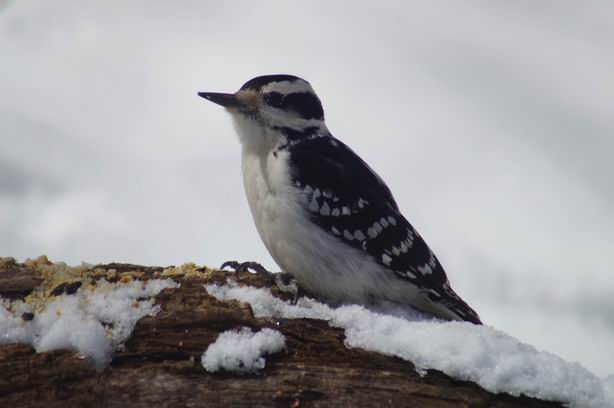
Miriam’s Nature Calendar, January: Woodpecker.
Toronto’s High Park is a refuge for birds that stick around through the winter, such as Great Horned Owls, cardinals and robins. Mixed flocks of chickadees, nuthatches, and woodpeckers move through the park looking for food, which in the winter also includes seeds and nuts provided by humans. Miriam always carried a container of seeds when she went to High Park. Photo by Miriam Garfinkle.
Joyce Nelson
January 17, 2022 - #
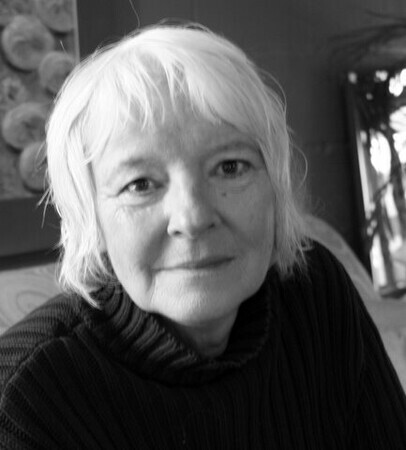
I just heard the sad news that Joyce Nelson died on January 4. I will miss the stimulating conversations we used to have when we met for coffee, and the many valuable and well-researched articles and books that she wrote.
Most recently, her writings were focused on the climate emergency, and especially the enormous carbon bootprint of the military, such as her April 2021 article For real climate action, let’s look at the military elephant in the room
Joyce wrote seven books, as well as hundreds of articles and radio documentaries. I especially recommend her two most recent books, “Beyond Banksters: Resisting the new feudalism” and “Bypassing Dystopia: Hope-filled challenges to corporate rule.”
Joyce was also a painter, and sometimes those lives overlapped. The book launches for the two books mentioned above were held in the art gallery which sold some of her paintings.
Kim Elliott writes about Joyce on the rabble website.
Laura Sky has written a lovely tribute to Joyce, also on rabble.>
Barrie Zwicker writes:
This is an unwelcome shock. Joyce and I were to have another lunch at The Outrigger but she cancelled because she had “a nasty cold coming on.” She’d given me permission to reprint her article “The Military’s Carbon Bootprint” in the forthcoming 4th edition of my monograph War, Peace and the Media. The first edition was published in 1983. With each revised and expanded edition the articles have reflected the unholy persistence of militarism. The 4th edition is retitled QUESTIONS OF SURVIVAL: War, Global Heating, Pandemics and the Media. In Joyce’s piece, originally published in the February-March 2020 issue of the Watershed Sentinel, she asks: “As the biggest single user of fossil fuels [on the planet], why is the military exempt from the climate discussion?” If anything, her piece remains stronger than ever. It can be found at watershedsentinel.ca/articles/the-militarys-carbon-bootprint She’ll be suitably recognized in the 4th edition. As a publisher – and former freelancer – I have a more than a clear conscience about the amount of the republication fee I chose to pay Joyce. Rest in peace, wonderful peacenik Joyce.
Joyce’s political and artistic voice and imprint will be sorely missed by me. Recently I hung on my living room wall one of Joyce’s paintings that I had purchased. I will never forget deciding to purchase it at a Fall display of the Beaches Arts & Crafts Show. I didn’t know its title at that point. Joyce asked me what it brought to mind. I replied that the word Portal came into my mind. “That’s it. That’s the title,” she replied.
Now she’s gone through a major portal.
Books by Joyce Nelson
The Perfect Machine: TV in the nuclear age
Sign Crimes/Road Kill: From Mediascape to Landscape
Sultans of Sleaze: Public Relations and the Media
Beyond Banksters: Resisting the New Feudalism
Bypassing Dystopia: Hope-filled challenges to corporate rule
A few of Joyce’s recent articles
The military’s carbon bootprint
The NED’s Useful Idiots
Saugeen Ojibway Nation Has Saved Lake Huron From a Nuclear Waste Dump
How Canada “Fights Tax Fraud” by Legalizing It
Venezuela: Target of Economic Warfare
For real climate action, let’s look at the military elephant in the room
A poem that Joyce wrote in 1996 (quoted in Laura Sky’s tribute to Joyce):
Already I know
that when the time comes
and my body falls away like a husk
I will rise like the heron
my blue wings graceful
and astonishing
while below the ocean endlessly
swells and rolls.
Nature Calendar February: Red Fox, Algonquin Park
February 1, 2022 - #
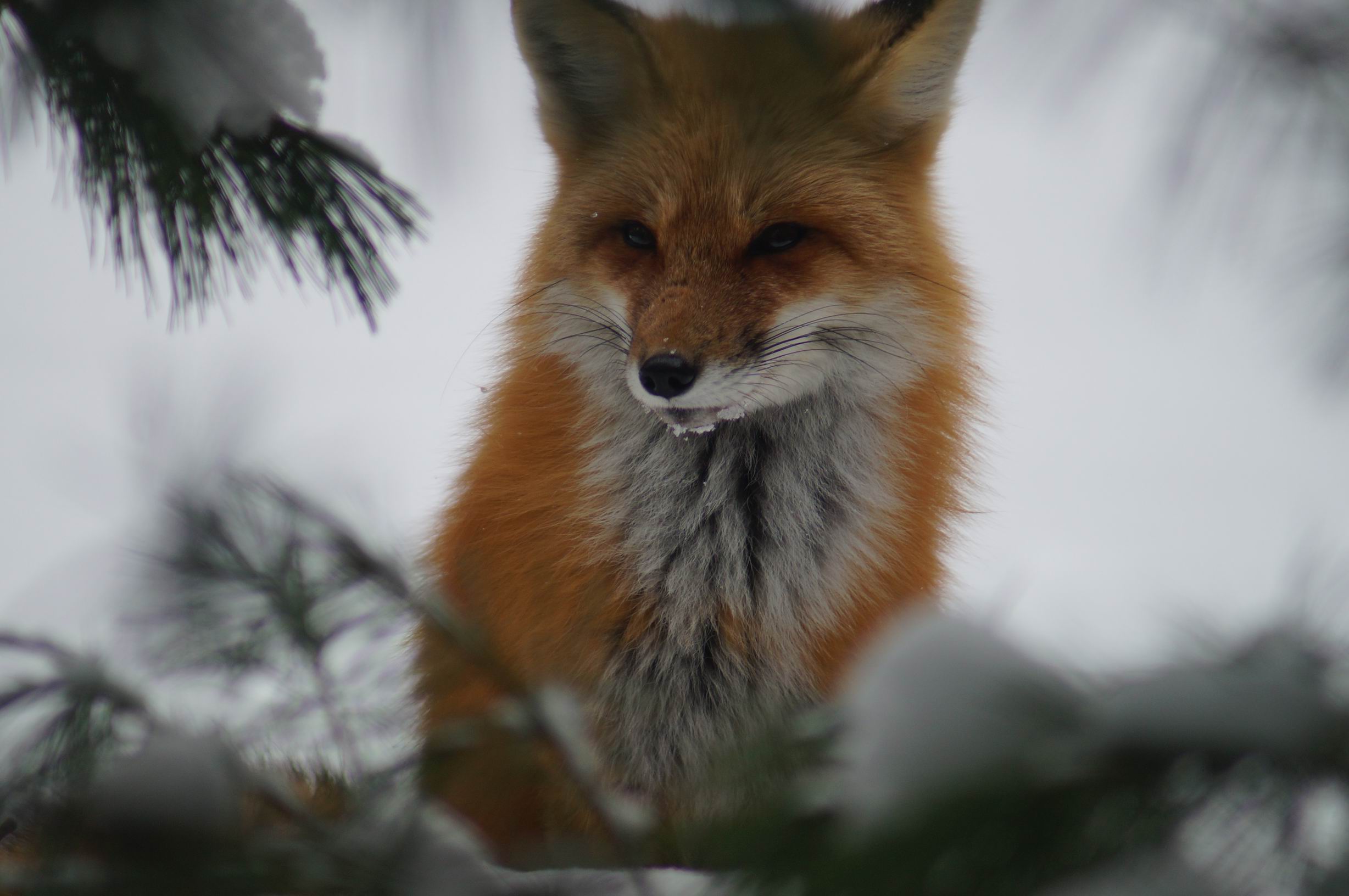
Miriam’s Nature Calendar, February: Red Fox, Algonquin Park.
This is the February photo in the 2022 edition of Miriam’s Nature Calendar, featuring Miriam Garfinkle’s photos. It was taken in February 2016. We were spending a few days in Algonquin Park, staying in the Mew Lake Campground. We were in a yurt, but there were also about a dozen tents, occupied by people hardier than we were. Many of the tents had little wood stoves, adapted to use in a tent, complete with little chimneys. People also had little camping cots in their tents which kept them off the ground. And then there were a few really hardy folks, who eschewed any of these sissy concessions to comfort, and embraced winter camping in its purest form. We admired them, but felt no desire to emulate them. At least I didn't; Miriam was made of sterner stuff, even while battling metastatic cancer, and might have given winter camping in a tent a try if she’d had a braver partner.
In any case, I was glad we had a yurt to sleep in. It was cold during our stay there, dipping to minus 33 at night, warming up to minus 25 during the day. We’d set out on our snowshoes or skis every morning, taking sips of water early on, because after an hour or so, our water bottles would be frozen. We encountered little wildlife on our outings except – of course! – chickadees, those hardy little survivors, sounding cheerful even in the bitter cold. And we saw this fox, which Miriam spotted under an evergreen. It didn’t seem to be perturbed by our presence, or by her camera.
Freedom Convoy
February 5, 2022 - #
I went to the “Freedom Convoy” rally in Queen’s Park today. I was working in the office this morning, just a block from Queen’s Park, and I went over to have a look. Given the media hysteria, and the dire warnings from police and politicians, I was curious to see for myself what it would be like. In the unlikely event that I am ever called upon to share my wisdom as an elder, two of my teachings would certainly be “The media lie” and “The police are not your friends.” Rather than trust them, I prefer to see for myself.
My first impression, heading into Queen’s Park North from the east, was visual: a sea of red and white, hundreds of Canadian flags. Once I got close enough to mingle into the crowd, I began to smell marijuana smoke. Lots of marijuana smoke. It’s a smell I find quite pleasant, as it happens. Brings back fond memories.
And now there was sound: Indigenous participants in the protest were doing a welcoming ceremony, drumming and chanting. They invited the crowd to join in, and hundreds of voices rose up together. It was a powerful moment.
There was more singing. A professional singer (I won’t mention her name to protect her from being subjected to online abuse) led the crowd in singing O Canada. That was followed by loud cheering.
Of course, since this was a protest, there were inevitably speeches. I have an extraordinarily low tolerance for listening to speeches, so I listened with half an ear while circulating through the crowd. I always do that at demonstrations: I don’t like standing in one spot very long. You also get to meet more people if you move around.
My overriding impression was one of cheerfulness. Smiles and laughter. Good vibes. I suspect for many of the participants, this opportunity to come together was a welcome break from being isolated because of their views and demonized by the media. For once, they were among people who weren’t hostile.
World Bonobo Day
February 14, 2022 - #
February 14 is World Bonobo Day. Bonobos are close relatives of chimpanzees, and the choice of February 14, Valentine’s Day, to honour them is no coincidence. Bonobos are the world’s sexiest primates, who live according to the philosophy “make love, not war.” Unlike their big-brained relatives, chimpanzees, gorillas, and humans, bonobos have been smart enough to develop a culture that is free of violence.
They are living proof that the claim of socio-biologists that all great apes, including humans, are genetically pre-disposed to be violent and wage war, is wrong. Bonobos have found another way: touching, caressing, and sex. Especially sex. As Susan Block says “These loving, sensuous apes have as many kinds of sex as humans do, in a veritable Bonobo Sutra of positions, including face-to-face, with multiple partners and in all combinations, as bonobos are bisexual or pansexual.” “But it’s not just how they have sex that makes bonobos so important, especially to humans. It’s how they use sex: for barter, friendship, stress-relief, anger management, conflict resolution and even political positioning that allows the females to gently dominate the males, and to prevent murder and war in their communities... no bonobo has ever been seen killing another bonobo in the wild or in captivity. Their uncanny ability to make ‘peace through pleasure’ is intrinsically related to their sexuality.”
One of their unique behaviours is what observers have dubbed ‘The Bonobo Handshake,’ that is, social sexual contact. "To strengthen their relationships, females will rub their genitals together. If anyone in the group, male or female, is feeling stressed, anxious, or irritated, someone will run over and give them a ‘bonobo handshake.’ This kind of conflict resolution seems to be at the heart of their peaceful society.”
There is one shadow: the bonobo population is declining because of the pressures of habitat loss and hunting. There are several organizations and foundations working to protect bonobos and their habitat, which many other species share. See www.blockbonobofoundation.org or www.bonobos.org.
In the meantime, Happy Bonobo Day! Enjoy!
World Hippopotamus Day
Feburary 15, 2022 - #
February 15 is World Hippopotamus Day. It is a day to honour the hippopotamus and support action to preserve hippos, which means preserving their habitat, protecting them from poaching, and minimizing conflicts between humans and hippos.
Once thought to be related to pigs and other even-toed ungulates, we now know that the hippo’s closest living relatives are actually whales, from which they diverged about 55 million years ago.
Appealing as they look in their own pudgy way, it is best to stay well clear of them. In Africa, about 500 people are killed by hippopotamuses every year, which makes them significantly more dangerous than lions and other large carnivores. They are short-tempered and aggressive, especially when protecting their young. If a boat enters their territory, they may overturn it and kill the occupants. On land, they can easily outrun the fastest human. Admire them from a distance.
But left alone, they are amazing creatures. We should all be grateful for that day 55 million years ago when evolution gave a whale a tiny nudge in a different direction, starting a development which eventually led to the wonderful hippopotamus.
Remembering Frank Showler 1919-2022
February 15, 2022 - #

I first met Frank Showler in 1975. I had just started a new job at Seven News, a community newspaper in the east-of-downtown area of Toronto. Frank was on the Board of Directors and, if I remember correctly, he was also one of the 200-odd volunteer distributors who together delivered 20,000 copies of the paper door-to-door on their streets or in their apartment buildings every second week. Frank was one of the elders, a steadying influence in guiding the paper. I was sometimes assigned to cover community events, and often I would run into Frank and Isabel at those events. I think I was impressed that older people were still so active.
Running into Frank became a predictable occurrence over the years and decades that followed. As people, including Matthew Behrens in his lovely tribute to Frank, have said, no protest or demonstration that took place in Toronto could be considered to have really happened unless Frank was there. But of course Frank was always there, and so I could be sure that the protest I was at was really happening.
In more recent years, I ran into Frank most often at the weekly Friday vigils in front of the Israeli consulate on Bloor Street. My partner Miriam took part in those vigils week after week, month after month, year after year. Originally the group was known as Jewish Women Against the Occupation, but eventually participation broadened, and stalwarts like Frank and Chandler Davis became regulars. They were relentless in their determination to fight for justice for Palestinians. I would sometimes come to the vigil, occasionally to participate, more often to meet Miriam so that we could head off to dinner together afterwards at Maroli or some other favourite place.
In August 2014, I was at Frank’s 95th birthday party at Friends House. Many of us came out to honour Frank and indulge in the food. There came the point where Frank was called on to make a few remarks. If we were expecting a few brief pleasantries, we were mistaken. Speaking without notes, Frank told us how he came to his beliefs and where they had led him. I did not agree with everything he said: unlike Frank, I thought, and still think, that it was necessary to fight a war to defeat Nazi Germany. But it isn’t necessary to agree about everything to respect and work with others, and Frank was a person whose commitment to justice and peace was unwavering and remarkable.
Miriam told me about being with Frank at a ‘toxic tour‘ at Aamjiwnaang in September 2015. Aamjiwnaang is situated in the midst of Ontario’s “Chemical Valley,” a sprawling complex of petrochemical plants near Sarnia. Residents of Aamjiwnaang have to deal with high incidences of cancer, asthma, and other health effects of toxic pollution. The term ‘environmental racism’ might have been coined specifically to refer to Aamjiwnaang. The ‘Toxic Tour’ was arranged to highlight the problems – and the source of the problems – and to organize broader action. The tour was a walking tour along long dusty stretches of industrial roads. It was a very hot day, and there was a bus for those who were unable to walk the distance. Frank, 96 at the time, walked. After a while, Miriam noticed that he seemed to be struggling in the heat. She got him to drink water, and then convinced him to take the bus for the remaining distance. She persuaded him that his presence, his act of solidarity, would be just as valuable and appreciated if he rode on the bus.
That was Frank: if there was injustice, he was there, doing his part. His memory will be with us for a long time.
Breaking News! Saddam Alive!
February 18, 2022 - #
Connexions has learned from confidential intelligence sources whose identity can’t be revealed that former Iraqi dictator Saddam Hussein (pictured below) is still alive, and is in possession of weapons of mass destruction which could be launched within minutes.
Intelligence sources have confirmed that the persistent rumours that Saddam did not die are in fact true. Saddam’s supposed execution on 30 December 2006 was staged as part of an elaborate fake news operation. As the world was being deceived into believing that Saddam was about to be executed, Valdimir Putin personally landed in Baghdad with a team of KGB agents who seized Saddam and flew him Russia. Putin then Photoshopped photos taken while Saddam was drunk on vodka to make them look him like he was dead.
Since that time, intelligence sources have revealed, Saddam has been staying in a cottage adjacent to Putin’s dacha in the Russian countryside. Putin also supplied Saddam with chemicals to mix up into weapons of mass destruction. These weapons are now ready to be launched against Ukraine within days, carried by rockets that Saddam built in his workshop.
Asked how they obtained this shocking information, intelligence sources explained that it was obtained by methods that can’t be revealed from persons who can’t be identified.
The main thing to keep in mind, they said, is that you should be very very afraid, and believe everything the government and the media tell you.

Saddam Hussein flaunts his weapons of mass destruction at the United Nations.

Situation Normal – February 24, 2022
News from the real world and beyond
February 24, 2022 - #
Deep thinking about what the census shows # The Toronto Star has published an in-depth analysis of the latest census data for Toronto, looking specifically at which areas of the city have grown in population in the last five years, and which areas have remained more or less the same. The startling conclusion – you may want to sit down before reading further – is that those areas of the city which have seen a lot of highrise construction have grown in population. The population of those areas which haven’t seen new highrises go up has tended to remain stable, or in some cases even declined a little. Who would have thought? Thank goodness we have journalists to figure these things out.
Of course, no feature article in the Star is complete without some finger-pointing and blaming. Karen Chapple, director of the University of Toronto’s school of cities, is glad to oblige. “What’s happening there [in the stable-population areas] is exclusion,” says Chapple. When existing residents ‘hold tight to their homes’, she said, prospective new residents are effectively shut out. In other words, people who live in the same house or apartment year after year, rather than making room by being considerate enough to die or at least move into a nursing home, are guilty of causing social harm.
One has to ask: isn’t that true of everyone who isn’t actually homeless and living on the street? Doesn’t Professor Chapple live in an apartment or a house? Isn’t she just as guilty of ‘excluding’ someone else from moving in by selfishly continuing to ‘hold tight’ to her home?
Measuring Canada’s climate change progress # If you’re wondering how Canada is doing in meeting its stated targets for cutting greenhouse gas emissions, here is a summary from the business press, in one easy sentence: “The Canadian Association of Petroleum Producers says it expects a 22 per cent increase in natural gas and oil investment in 2022.”
Netanyahu’s legacy # An Associated Press (AP) story, carried by many corporate media outlets, reports that former Israeli Prime Minister Benjamin Netanyahu is seeking to negotiate a plea deal in his bribery trial. The goal is to avoid an “embarrassing and protracted trial,” says AP, that “risks tarnishing his legacy.”
Isn’t that rather like worrying that a shoplifting conviction could “tarnish” Jack the Ripper’s legacy?
In related news, Israel has announced that it is setting up a national inquiry after it was reported that Pegasus, a cellphone hacking tool made by an Israeli company, had been used to obtain information from Netanyahu’s confidants and other public officials. It was reported last year that Pegasus is being used against journalists and human rights activists in countries guilty of human rights abuses. That’s fine, of course, but targeting elite members of the regime is not. Pegasus, said Israeli Prime Minister Naftali Bennett, was “not intended to be used in phishing campaigns targeting the Israeli public or officials.”
Glorification of Nazism # On December 16, the United Nations voted on a resolution to condemn the “glorification of Nazism.” Only two countries voted against the motion: the United States and Ukraine. The United Kingdom and Canada abstained.
Facebook threatens to leave Europe # Meta Platforms is threatening, once again, to shut down Facebook and Instagram in Europe if the European Union insists that users’ data be stored in Europe, not in the United States. European Union regulators are demanding the move because of a lack of privacy protection in the U.S. Meta claims that if these rules are imposed it would “likely be unable to offer a number of our most significant products and services, including Facebook and Instagram, in Europe.” The real issue is advertising revenue: Meta fears that it would not be able to sell as much advertising, or to target it as effectively, under the stricter European privacy rules.
We are left to wonder: How long could Europe survive if Europeans couldn’t use Facebook or Instagram? The whole world is holding its breath.
“No rule was ever broken” # Ian Scott, the chair of the Canadian Radio-television and Telecommunications Commission (CRTC) is digging in to defend himself in the face of calls for him to be removed from his post, or at least required to recuse himself from deliberations related to Internet competition. This is after it was revealed that Scott met in a bar with a senior Bell Canada executive while the CRTC was in the midst of making decisions about the fees that smaller Internet service provides pay to Bell and other large companies. Scott, himself a former executive in the field he is now charged with regulating, has responded by saying that “no rule was ever broken.” That may well be true, but if that’s the case, perhaps it’s time for some new rules, including rules prohibiting former executives being allowed to hold positions regulating corporations they used to work for.
Through the lens of clichés # Every topic that attracts any attention is now being looked at “through a lens” of one kind or another. Like every cliché that becomes popular, looking at things “through a lens” is now dropped into “conversations” about pretty well anything.
An article in the Toronto Star about the problem of snow that blocks driveways after snowplows have gone by proclaims that it will approach this and other problems by “taking ideas from other places and running them through the lens of Toronto.” It’s not clear how you ‘run things through a lens’, but if it is possible, one wishes the Star would occasionally run its articles through the lens of a copy editor.
Curated Ears # Once upon a time, a curator was someone who managed a collection in a museum or similar institution. Curating was what they did. Now everything that involves selecting or displaying anything, anything at all, is known as curating. The latest is “curated ears.” When I first saw the headline, I thought someone had set up an ear museum along the same lines as the penis museum in Iceland. But no: curated ears are when you wear earrings that you chose carefully and really like. I get it: I have a carefully curated drawer full of socks. It’s a very selective: only socks that don’t have holes are included.
Refreshed and enhanced # A tax form I received from a financial institution informs me that their Account Agreement & Disclosure Document has been “enhanced.” It’s part of an initiative aimed at “refreshing” investment industry rules. I already feel refreshed, just from reading about it.
What I’ve Been Reading
Modern Politics, by C.L.R. James
This is the text of six lectures that C.L.R. James gave in Trinidad in 1960. James covers a vast canvas, from ancient Greece to Marxism and the modern world. He deals with complex topics, which he explains in clear language. He respects his audience, and expects them to work a bit to get the most from what he presents. I heard C.L.R. James speak in Detroit in the 1970s, and was impressed on that occasion too by the richness of his thought. I find I can always return to James’ writings, and get something new out of them.
When Memory Speaks, by Jill Ker Conway
The subtitle of this book is “Exploring the Art of Autobiography.” Conway looks at a diverse selection of memoir writers, whom she groups under chapter headings such as “The Romantic Heroine,” “Feminist Plots,” “Assertive Women,” and “Grim Tales.” Her comments on her subjects shed light on them, and the cultural context in which they find themselves. Conway is a historian, thank goodness, rather than a literary critic, so she writes well and interestingly.
The main enemy is at home
February 25, 2022 - #
“The main enemy of every people is in their own country!”
– Karl Liebknecht, addressing the anti-war movement in Germany after the outbreak of World War I
*
The outbreak of war is always a human disaster with unforeseeable consequences. The ‘fog of war,’ incessant propaganda, rapidly changing events, our own confused thoughts and emotions, all make it exceedingly difficult to know how to react.
Unfortunately war is by no means an unusual event, so we can look to the experiences of others in the past to see how they reacted to war.
The war that more than any other shaped the modern world was the First World War, called the Great War at the time. The beginning of the First World War was marked by a world-historic tragedy: the collapse of the Socialist International, all of whose members had pledged that they would oppose any imperialist war and call on the workers of all countries to refuse to fight their fellow workers in other countries. As soon as war was declared, the major socialist parties abandoned their principles and rushed to support ‘their’ country in the war. Only in Russia and Serbia did socialist parties stand firm in their opposition to war.
Prior to the war, socialists had been clear that the policies of all the major capitalist powers were pushing Europe toward war. The question was not whether there would be war, but when it would break out, and what particular incident would trigger it. In the years before 1914, there were in fact a number of close calls when war seemed imminent, only to be averted at the last minute when one side or the other backed down, or some face-saving compromise was found. For socialists, it was clear that all the capitalist powers would be responsible for the outbreak of the war they had been preparing for years, regardless of what side fired the first shot.
A small courageous minority maintained that position once war broke out. In Germany, Karl Liebknecht emerged as the leader of the anti-war socialists. The slogan which he made famous was “Der Hauptfeind steht in eigenen Land!” - “The main enemy is at home!”
Liebknecht said: “The main enemy of the German people is in Germany: German imperialism, the German war party, German secret diplomacy. The enemy in our own country is the enemy we must fight.”
Liebknecht’s message is just as valid today as it was then. For those of us who live in the U.S. Empire, that is, the United States and its NATO client states, including Canada, the main enemy is US/NATO imperialism, and our own countries’ complicity in that imperialism. This is the enemy we must fight.
*
This week’s events in Ukraine did not start a few days ago. They were the predictable, if not inevitable, outcome of US/NATO imperialism over the last 30 years. The dissolution of the Soviet Union in 1991 should have been quickly followed by the dissolution of NATO, if NATO had actually been the defensive alliance it claimed to be. The opposite happened: NATO not only remained in existence, but expanded, pushing relentlessly closer to Russia’s borders (Poland, Hungary, Czech Republic), and launching wars of aggression (Yugoslavia/Serbia, Afghanistan, Libya). This, it was clear, was an imperialist alliance aimed at world domination, and above all at Russia and China, the two countries most guilty of the crime of trying to resist U.S. domination.
It was not clear to everyone, of course. All-too-many liberals and activists followed in the footsteps of the socialists who had betrayed their principles in 1914, and cheered on the bombing of Serbia and Libya. Repeating slogans about “duty to protect” and “humanitarian intervention,” people who had once identified with the left were now cheering on NATO’s humanitarian bombing of civilian populations.
Russia tried for years to negotiate agreements that would respect its security. Again and again, the U.S. made it clear they had no intention of co-operating. On the contrary: they unilaterally backed out of arms limitations treaties such as the treaty covering intermediate-range nuclear weapons, announced plans for the militarization of space, and declared that they reserved the right to use nuclear weapons first, posing the nightmare threat of a first-strike attack on Russia.
Events in Ukraine pushed Russia to draw the line. The violent overthrow of Ukraine’s elected government in 2014 led to the establishment of a regime in which fascists and outright nazis played a significant role, especially in the armed forces. The new government moved immediately to remove the status of Russian as an official language. Violent attacks on the Russian-speaking minority by fascist militias became regular events, leading residents of the predominantly Russian-speaking Donbas to arm themselves and defend their territory.
From 2014 until 2022, Russian president Vladimir Putin sought a negotiated settlement, including autonomy for Donbas within a federal Ukraine, and binding guarantees that Ukraine would remain neutral, would not become part of NATO, and would not host missiles and other offensive weapons aimed at Russia. He continued to seek a negotiated settlement until early February 2022.
He was decisively rebuffed: the U.S. broke off negotiations; a large force of Ukrainian military and fascist militias began to mass on the borders of Donbas; artillery attacks against Donbas greatly increased; and – the last straw – on February 19 Ukrainian president Zelensky said Ukraine was considering acquiring nuclear weapons.
*
Like other wars, this one is the outcome of a long series of causes. What can we do now that it has started?
That depends, of course, on who ‘we’ are and where we live. Courageous people in Russia have taken to the streets to protest the war. Russian members of the International Marxist Tendency have issued this statement of opposition to the Russian intervention. They have bravely taken on their responsibility to oppose military intervention by their government.
There is no need for those of us who live in the American Empire to devote energy to denouncing Russia. The entire corporate and state media around the world are already doing that. A few voices on the left echoing what the Empire’s worldwide propaganda apparatus is already saying are meaningless. The only advantage to doing so is that it takes no courage.
Our duty, I suggest, is to heed Karl Liebknecht’s call: “The main enemy is at home.” That enemy – U.S. imperialism, NATO, Canada’s complicity, and the military-industrial complex – is the enemy we must fight. It’s a hard thing to do, and it takes some courage, perhaps, but it’s something that could perhaps make a difference in the long run.
Ulli Diemer
Related Reading:
Russia-Ukraine Resources: History, context and analysis of the crisis
Experts Warned For Years That NATO Expansion Would Lead To This
John Mearsheimer on the siuation in Russia and Ukraine
US Foreign Policy Is a Cruel Sport
War in Europe and the Rise of Raw Propaganda
Keywords: Intervention – NATO – Russia – Ukraine – U.S. Imperialism
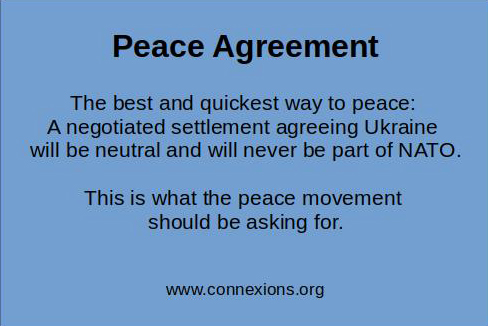
Further reading: Russia-Ukraine Resources: History, context and analysis of the crisis
Nature Calendar March: Mallard
March 1, 2022 - #
I turned the page on my calendar this morning (the calendar featuring Miriam Garfinkle’s photos which I have been producing since 2019). Farewell to February’s Fox, which Miriam photographed in Algonquin Park when it was minus 25, and on to March’s Mallard, swimming vigorously in the sun-dappled waters of Grenadier Pond in Toronto’s High Park.
Then I went out for a walk. I heard a Cardinal singing, saw a Robin eating berries, heard and saw Canada Geese flying north. The wind felt a little like a breeze, rather than a blast from the Arctic. It felt like maybe, just maybe, Spring might be on its way. It lifted my spirits.
Oh, I know, the Cardinal has been here all winter, as has the Robin. So have the Canada Geese, who are probably just flying up from the lake to a favourite feeding spot, from whence they will return to Lake Ontario this evening. And there are many, many Mallards overwintering in Grenadier Pond, thriving on the food that helpful humans, including a certain five-year-old dear to my heart, bring to them on a regular basis.
But for all that, and all that: Spring is coming!

This is the March photo in the 2022 edition of Miriam’s Nature Calendar, featuring Miriam Garfinkle’s photos. If Mallards were rare, people would be out with their binoculars and cameras admiring these attractive birds. Because they are common, they get less attention. Miriam liked them, and was happy to photograph them.
How are the Germans keeping warm?
March 1, 2022 - #
With the invasion of Ukraine, how are the Germans keeping warm? They largely heat with natural gas, and much of the natural gas they use for heating comes from Russia.
Answer: Russia is continuing to send them natural gas, as always. Much of it transits Ukraine. Even as their soldiers fight each other, Russian and Ukrainian technicians are continuing to work together to keep the gas moving. Russian shipments have actually increased since the start of the invasion because of increased demand in Western Europe. It’s cold in winter.
The Americans want sanctions to prevent the Russians from exporting gas. Canada does too. Canada says it can build a LNG terminal on the east coast which could be used to ship gas to Europe – a few years from now. We’re always glad to help, especially if it increases the profits of the oil and gas industry.
Those who advocate sweeping across-the-board sanctions – better described as economic warfare – might want to consider the implications, i.e. who gets hurt. The Americans don’t care. Asked if she was bothered that at least half a million Iraqi children had died because of U.S.-imposed economic sanctions, U.S. Secretary of State Madeleine Albright said “we think the price is worth it.”
It’s always ordinary people who are hurt by economic warfare. This is all the more true in today’s highly integrated international economy.
Economic warfare kills people. Sending more weapons into a war zone also kills people, and in the present situation, increases the chances of all-out nuclear war breaking out.
We need negotiations, not escalation.
Two Minutes Hate
March 8, 2022 - #
Sometimes when the real world seems too overwhelming, it’s comforting to settle down with a novel, preferably some light escapist fiction, and just get away from it all. Like this old favourite:
“The next moment a hideous, grinding speech, as of some monstrous machine running without oil, burst from the big telescreen at the end of the room. It was a noise that set one’s teeth on edge and bristled the hair at the back of one’s neck. The Hate had started....
Before the Hate had proceeded for thirty seconds, uncontrollable exclamations of rage were breaking out from half the people in the room. The self-satisfied sheep-like face on the screen, and the terrifying power of the Eurasian army behind it, were too much to be borne: besides, the sight or even the thought of Goldstein produced fear and anger automatically. He was an object of hatred more constant than either Eurasia or Eastasia, since when Oceania was at war with one of these Powers it was generally at peace with the other....
In its second minute the Hate rose to a frenzy. People were leaping up and down in their places and shouting at the tops of their voices...
The horrible thing about the Two Minutes Hate was not that one was obliged to act a part, but, on the contrary, that it was impossible to avoid joining in. Within thirty seconds any pretence was always unnecessary. A hideous ecstasy of fear and vindictiveness, a desire to kill, to torture, to smash faces in with a sledge-hammer, seemed to flow through the whole group of people like an electric current.”
George Orwell, Nineteen Eighty-Four
International Day of Action for Rivers
March 14, 2022 - #
March 14 is the 25th International Day of Action for Rivers.
The announcement says: “The International Day of Action for Rivers is a day dedicated to solidarity – when diverse communities around the world come together with one voice to say that rivers matter. That communities having access to clean and flowing water matters. That everyone should have a say in decisions that affect their water and their lives. That it’s our time to stand up for these rights, now more than ever. Rivers are key to restoring and maintaining the world’s biodiversity. River systems are the zone of Earth’s highest biological diversity.“
This is a cause I can whole-heartedly support. Rivers have always been special to me, starting perhaps when the ship that brought my mother and me to Canada sailed up the St. Lawrence River. The lower St. Lawrence is no longer the ocean, but it is not quite river yet, or perhaps it is both: it is in transition, as my life was in transition as we slowly headed up the river.
Growing up in Toronto, the Don River and all the little creeks that flow into it were special places that I loved to explore. I still return to them regularly. Later I branched out to the Humber and the Rouge. For many years, the Saugeen was the river closest to my heart: I canoed, kayaked, swam, and simply sat by the shore watching it. I watched it flow by in quiet tranquility – and I watched it rise more than ten feet in a few hours and triple its width as it flooded the land.
There are others: the Grand River flowing through Paris, Ontario, the little Kagawong River on Manitoulin Island, the majestic Saint John River (Wolastoq to the Maliseet) in New Brunswick, and the Exploits and Humber Rivers in Newfoundland – all of them are rivers I have come to have a special relationship with. The living waters of a river are among the most precious glories this planet has to offer. I am always drawn to rivers. I treasure them.
The photo is of the Saint John (Wolastoq) River near Hartland.
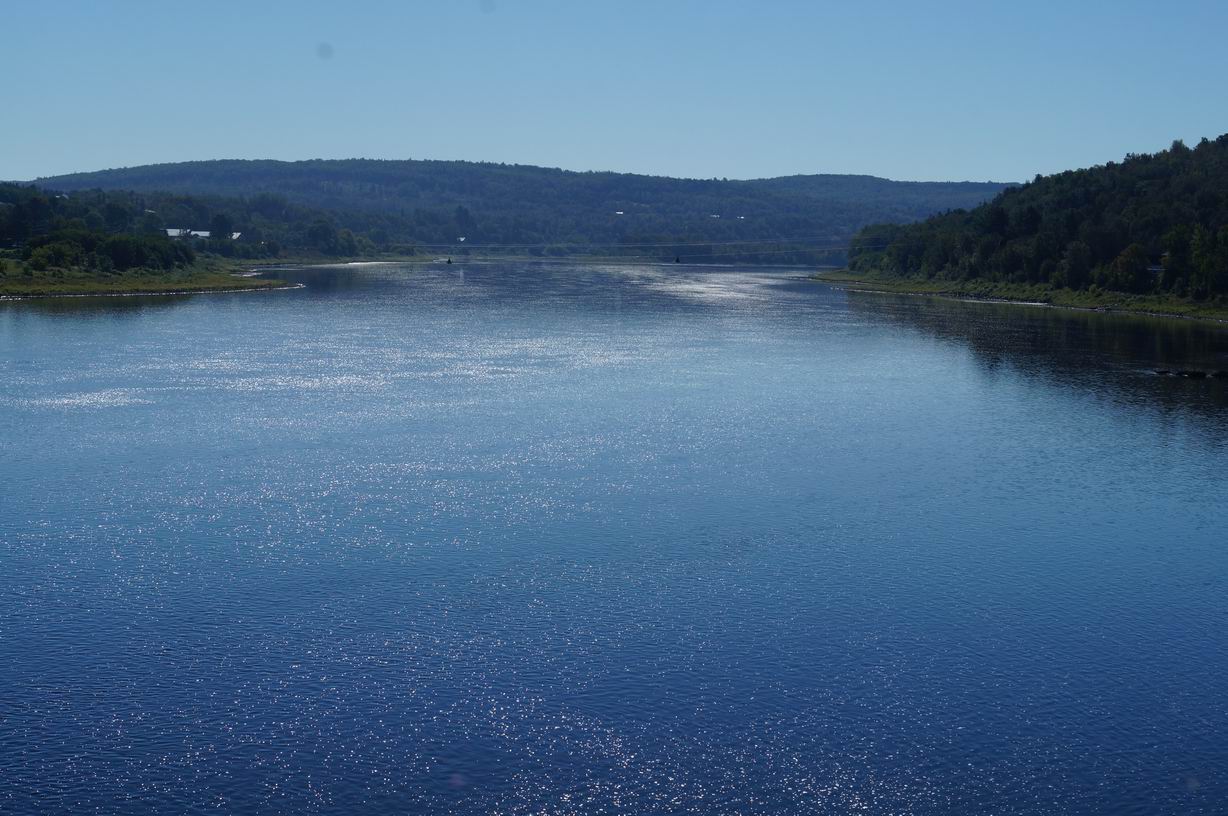
Time to cancel subscriptions to the Toronto Star
March 16, 2022 - #
I cancelled my subscription to the Toronto Star today. Here is the letter I sent explaining my cancellation:
I will not be renewing my subscription. This renewal notice arrived on the same day that the Star carried an editorial headed “Thinking the Unthinkable” which argues in favour of taking military actions which will greatly increase the risk of nuclear war. The editorial takes the position that “actions which were previously unimaginable” - i.e. military escalation up to and if necessary including nuclear war, should now be on our collective agenda. It seems that the Star’s editorial writers (and Rosie DiManno, in her article in the same paper) think that anything, up to and including the annihilation of most of the human race, and many of the other life forms on this planet, is preferable to sitting down with the Russians and negotiating a peace settlement in which all sides make compromises. This is insanity, and it is criminal.
The Star’s foreign coverage has always been appalling: pure pro-US/NATO propaganda, cheerleading for US/NATO interventions and war crimes in Iraq, Afghanistan, Libya, Syria, Yemen, etc. I stuck with the Star despite its massive failings as a newspaper because it provides some half-hearted coverage of local news, has one or two good columnists, and occasionally publishes good investigative journalism on local (Toronto/Ontario) issues.
I can no longer in good conscience provide any financial support to a newspaper that is doing its best to push us to nuclear war.
Is this how it all ends?
March 16, 2022 - #
The possibility of nuclear war is increasing day by day.
The mainstream corporate and state media are all pushing for dramatic military escalations. You would think that an order has gone out from the Pentagon to the media, but of course, that’s not the way it works. Our media are more sophisticated: a few key journalists are given exclusive off-the-record briefings by U.S. government officials; those elite journalists produce stories uncritically parroting the line they have been fed, thousands of other journalists and media outlets then produce their own versions of the same talking points, and subsequently those same talking points are amplified by hundreds of thousands of willing accomplices via Twitter, Facebook, etc.
The line that the media is now pushing is that the US/NATO Empire should intervene militarily in Ukraine, including imposing a ‘no-fly zone’, even at the risk of nuclear war.
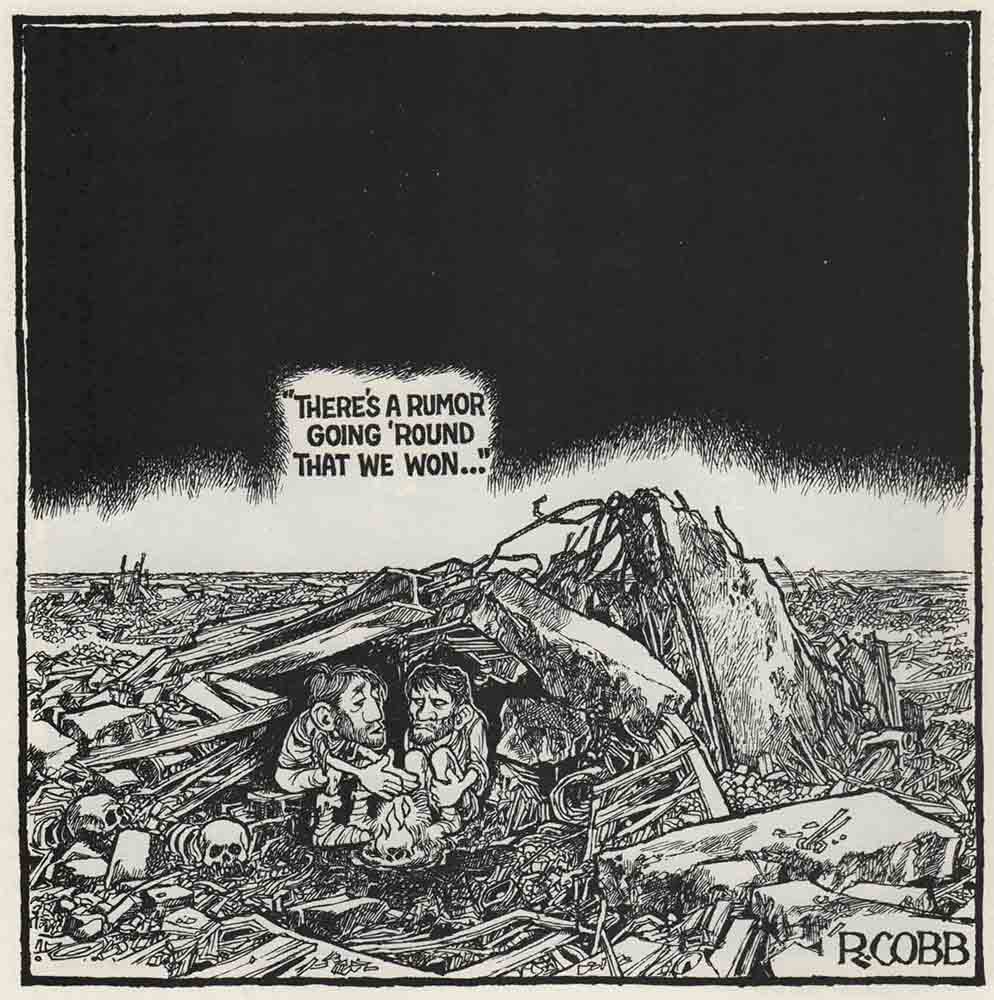
Down at the lake
March 18, 2022 - #
Down at the lake
Redwings announce their arrival
Winter ducks prepare to leave
A beaver takes a leisurely swim
And grebes loudly declare their passion.
Spring!
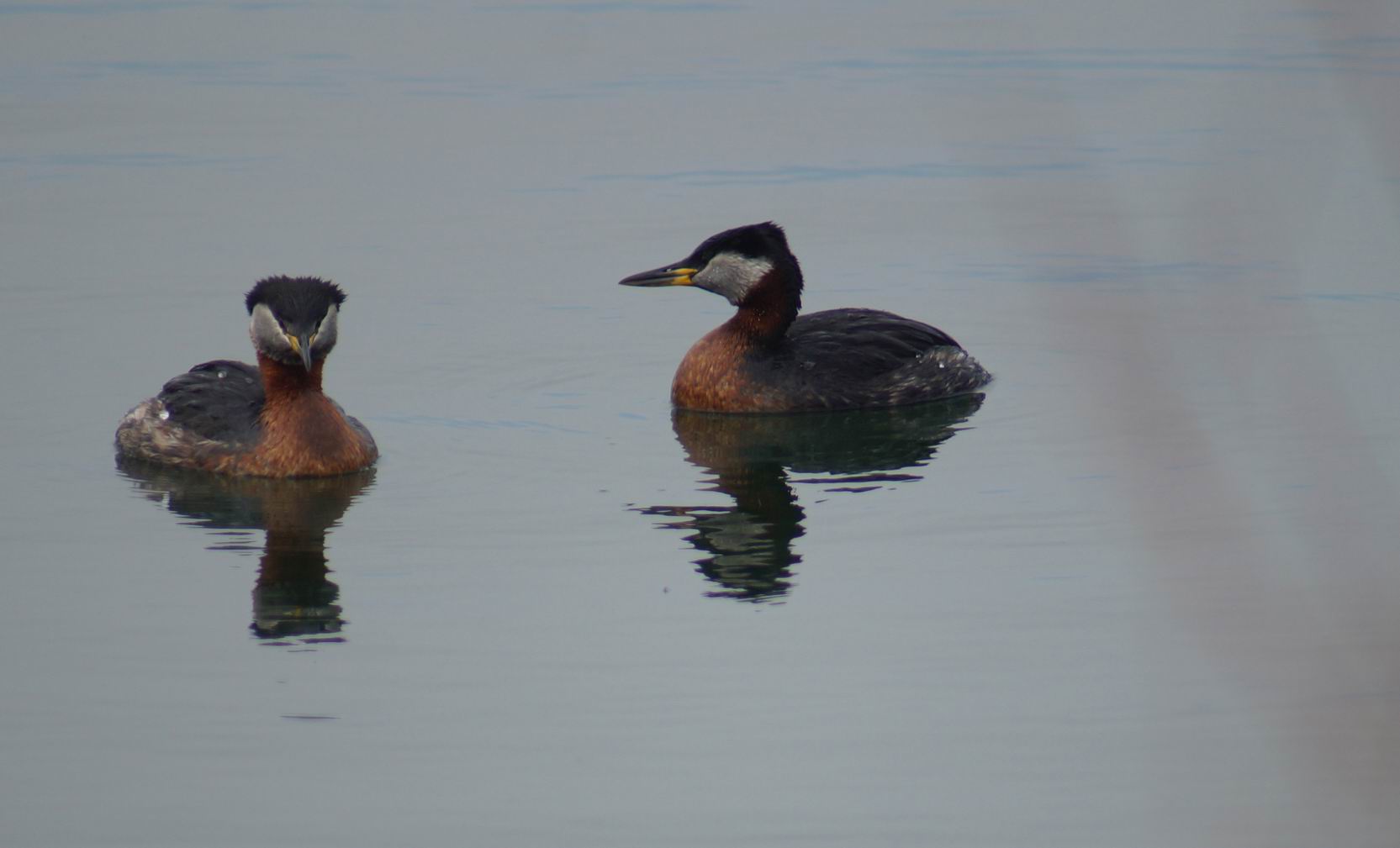
‘When I hear the word Culture ... I reach for my gun’...
March 19, 2022 - #
In Hanns Johst’s play Schlageter (which premiered in 1933 in a performance attended by Adolf Hitler) one of the characters says “Wenn ich Kultur höre ... entsichere ich meinen Browning!” (“When I hear ‘Culture’... I release the safety catch on my Browning!”)
Over time, the line entered popular discourse as “When I hear the word ‘culture’ ... I reach for my gun.”
In the following years, many people reached for their guns, willingly or not, though most of those who died were civilians. Somewhere between 70 and 85 million people perished in World War II. The country that suffered the most was the Soviet Union, where 27 million died as a result of the Nazi invasion.
Nine decades later, the voices of hatred and the calls for reckless military action are once again growing louder, day by day. Another World War seems a real prospect.
Today our culture is dominated by propaganda pushing us to join in a chorus of hate, and calls for escalation, even at the risk of nuclear war.
Faced with this culture of demonization, I reach for poetry instead.
Edna St. Vincent Millay’s poem Conscientious Objector expresses my own feelings today:
I shall die, but that is all that I shall do for Death;
I am not on his pay-roll.
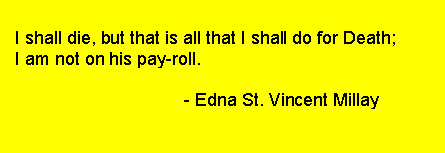
World Frog Day
March 20, 2022 - #
It was rather exasperating. We could hear the birds, several of them, up in the trees above our campsite in Arrowhead Park, but we couldn’t see them, even though we had binoculars and were checking out the branches their calls seemed to be coming from. This happened several times during the day, and then again the next day. Each time, the binoculars came out, we looked up – and nothing. It was quite puzzling.
Eventually a Park employee came by, doing his rounds of the campsites. “Do you know what is making those sounds?” Miriam asked him. (In our relationship, Miriam was in charge of speaking to strangers.) “Those are Gray Treefrogs,” he said. “You can’t see them because they are the same colour as the bark of the tree.” Ah! Live and learn!
Frogs are tricky. We had a similar sort of experience one spring day in another Southern Ontario woodland. Several vernal ponds had formed, and from one of them, we heard the sounds of ducks. We were a bit surprised that ducks should choose this spot in the woods, just a few dozen yards away from the river, but we were happy to go check them out. Only – there were no ducks. It was a small pond, no hidden spots where ducks could be lurking. But the quacking continued. Closer examination revealed that the quacking sounds were being made by little frogs: wood frogs, as we later learned. The males make quacking sounds to attract females. This seems to work well: wood frogs are widespread throughout North America. They are the only North American frog found north of the Arctic Circle. Wood Frogs, like Spring Peepers, can tolerate below-freezing temperatures: no mean feat for a cold-blooded animal.
Spring Peepers are usually the first to appear in Ontario. They can be heard – peeping enthusiastically – when ponds are still partly covered with ice and patches of snow persist along the shore. We often associate spring with birdsong, but choruses of Spring Peepers can be heard when most of our migratory birds are still well to the south. It’s a sound, I find, that makes me happy.
Peak frog season comes a bit later in the spring. One of the best places I know of to hear frogs is MacGregor Point Provincial Park on Lake Huron. There are several large ponds in the park which provide ideal frog habitat. In April or early May, when frog mating season is at its peak, you can sit beside a pond and immerse yourself in frog sound. They can be extraordinarily loud, especially when several species – Spring Peepers, Wood Frogs, Leopard Frogs, Chorus Frogs, and Mink Frogs – combine in a frenzied cacophony. There were times at MacGregor when we debated whether we should wear ear protection when we sat next to the marsh. Male frogs, like males of certain other species, seem to have a mating strategy that boils down to ‘choose me, I’m the loudest.’
Sadly, frogs are not doing well. Frog populations around the world are declining; a number of species are on the verge of extinction. The reasons are complex, but ultimately it seems that climate change and the contamination of fresh water, even hundreds of miles from the source of pollutants, are to blame. Frogs breathe through their skin, which makes them particularly susceptible to contaminants. Frogs, and amphibians generally, are indicator species, comparable to the canaries in the coal mine. They are telling us that things are not going well on our planet. World Frog Day exists to draw attention to the problems of frogs – as well as to celebrate them. To celebrate them, head out into frog breeding territory in April, and enjoy the chorus of frog-song.
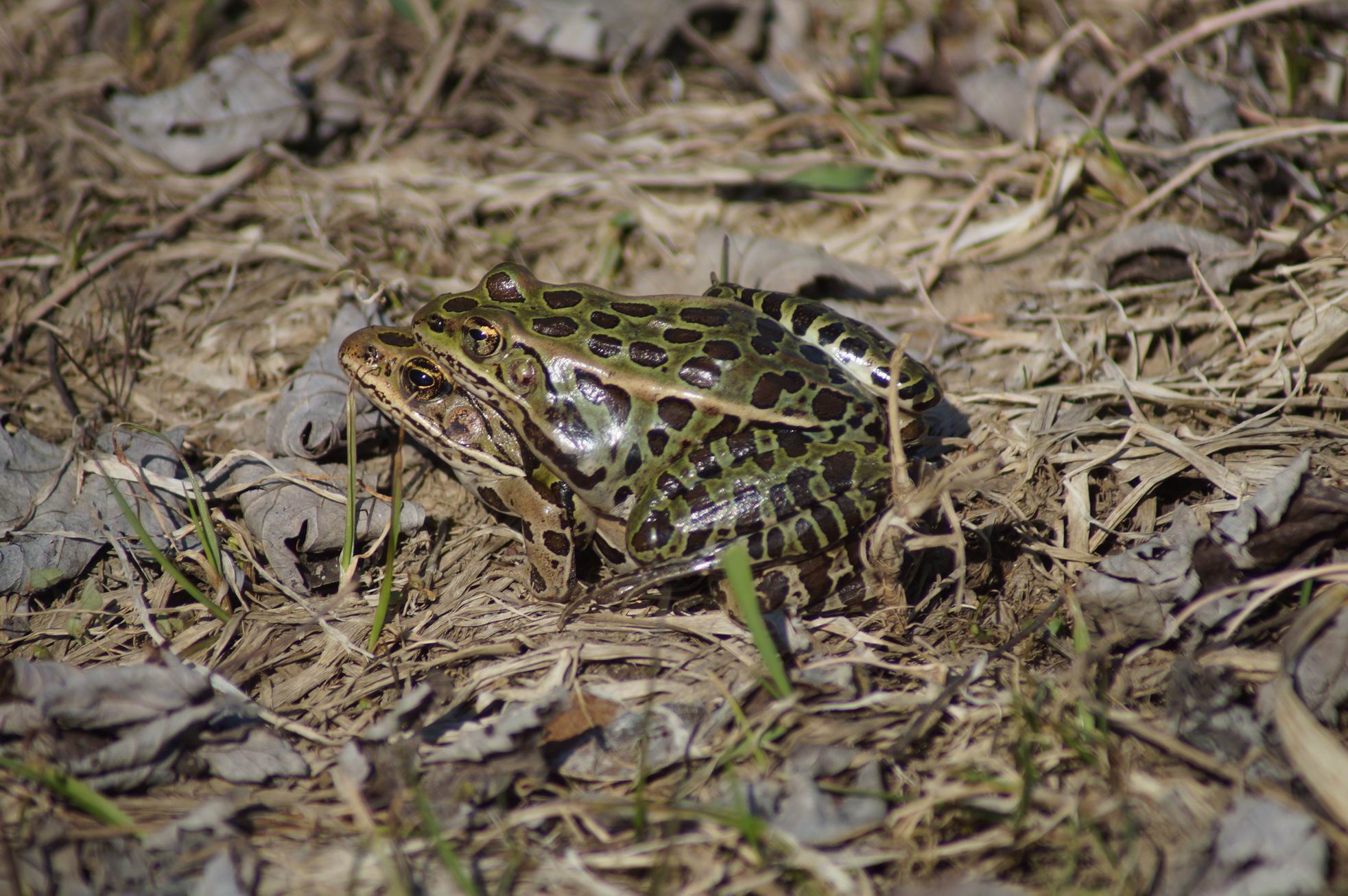
Northern Leopard Frogs, MacGregor Point, May 1, 2018. Photo by Miriam Garfinkle.
Thinking about Terry Fox and the Marathon of Hope
April 12, 2022
Terry Fox dipped his artificial leg into the Atlantic Ocean off Cape Spear on April 12, 1980 and started running west: toward the Pacific. His Marathon of Hope was underway.
Before he set off, he filled two bottles with water from the ocean. They symbolized his hopes: one was to be a souvenir, the other he planned to empty into the Pacific Ocean when he completed his cross-continent run.
Cape Spear, the easternmost point in North America, owes its name to Portuguese fishermen for whom the sight of this desolate windswept promontory represented hope. “Spera” is Portuguese for hope. There is reason for hope when Cape Spear comes into view, as long as you steer clear of the rocks and the icebergs. St. John’s Harbour – sheltered and often 10 degrees warmer than Cape Spear – is only ten kilometers away.
Hope and determination were what fueled Terry Fox when he set off on that cold and blustery morning.
Dear Al Gorithm
May 7, 2022
I am the webmaster for two substantial websites – Connexions.org and Sources.com – and I also have a personal website called Radical Digressions (www.diemer.ca). Each of those websites has a public email address which receives a steady flow of unsolicited emails, including inevitably a certain quantity of spam and scams.
While most of the spam goes straight to the Junk folder, I do like to monitor some of it now and again just to have an idea of what the current trends are.
Some of the scams, it seems, have amazing staying power. The widows with a fatal illness and a fortune they wants to give to me personally (just as soon as I provide my banking information) have been around for a very long time. I wrote about one of them – Lady Martha’s story – back in 2008. (My interest in spam, it seems, also has staying power.) I just received another one from an unfortunate lady who has a “serious deadly disease” which is likely to kill her within weeks. That truly is serious. She is “legally married to the deceased Peter Adalwolf,” an oil industry executive who has left behind a fortune of 2,500,000 euros, which she wants to turn over to me before she dies. As long as I promise to disburse 70% of it to worthy charities, so she tells me, I can keep 30% as compensation for my efforts. The euro has been plunging in value in the wake of the sanctions against Russia, while the rouble has been increasing in value, but even so, 30% of 2.5 million euros is a sizeable sum of cash. It’s a tempting offer.
Another current trend is Search Engine Optimization (SEO) spam. These are emails asking us to include a link from our website to an article on another website which they are promoting. These are legitimate enough, in their way: they are trying to raise the Google ranking of the websites on whose behalf they are working by getting other sites to link to them. Naturally, doing this kind of work involves sending out many, many emails, since only a small number of recipients will actually agree to add a link.
Their first step is a Google search to find articles on other websites which cover the same subject matter as the pages they are trying to promote. Our websites have a large number of articles, so inevitably they show up in quite a few searches: The Connexions.org website alone has more than 350,000 files. (Yes, that is quite a lot, isn’t it? Maybe you should check it out sometime!)
The next step is to send the webmasters of the sites identified as good prospects emails asking for a link. These emails are signed by people whose names follow a remarkably similar pattern: they all happen to have short Anglo names. We regularly get emails from Jenn, Jane, Jean, Jesse, Jo, Alexis, Andy, Amanda, Lauren, Leo, and Emily. One might conclude that diversity in hiring is not a priority for the companies employing them: one never hears from a Mohammed or a Mei Ling or a Jamal. Not even an Ulli! And absolutely no Vladimirs.

Situation Normal – May 25, 2022
News from the real world and beyond
May 25, 2022 - #
Laws that matter, and laws that don’t matter so much # The Ontario Divisional court has ruled that the Ontario government failed in its constitutional duty to consult First Nations when it issued mining exploration permits on Treaty 9 land. Does that mean that the permits are invalid? Of course not. The permits stand anyway. There are no consequences for ignoring indigenous rights.
Definition of “good employer” broadened # Ontario’s Conservative government has announced that companies which are under active investigation for workplace violations, as well as companies with high rates of serious injuries, will be eligible for refunds from a $1.5 billion Ontario program set up to reward employers with good safety records.
The struggle against imperialism, as seen from New York # “Imperialism and the Struggle Against It Begins at Home.” That’s the headline on an article in CounterPunch by Stanley L. Cohen, identified as “a lawyer and activist in New York City.”
The headline, appearing as it does on an ostensibly left-wing website, might lead you to expect a political analysis in the tradition of Karl Liebknecht’s World War I slogan “The main enemy is at home!” But no, this is not an article calling on Americans to struggle against American imperialism. It’s yet another anti-Russian screed. For a lawyer living in New York City, it seems, attacking imperialism “at home” means attacking Russia. And the editors at CounterPunch think this is something worth publishing.
Libraries are becoming hubs for learning and study! # An actual quote from an article by Globe and Mail columnist Marcus Gee: “Libraries are evolving. Instead of cloistered fortresses for safeguarding books, they are becoming teeming hubs for group learning and inventive study.”
Has Marcus Gee every set foot in a library in his life? Have institutions that house books ever been anything but places of study and learning? Anyone who knows anything about libraries would know that they have been “teeming hubs” of learning and study from the beginning. The Library of Alexandria was teeming with readers 2200 years ago, many of them discussing what they were reading. Karl Marx was engaged in inventive – and intensive – study in the library of the British Museum more than 150 years ago.
Marcus Gee might want to open the doors to the cloistered fortress of his brain and let some air in.
Good idea, flawed implementation # Someone in the U.S. Bureau of Land Management had a good idea: protect dinosaur tracks in Mill Canyon, Utah, by building an observation boardwalk adjacent to the tracks, to keep people from walking on the tracks. A work crew was duly sent out to do the work. In the course of doing their work, they drove heavy vehicles over the dinosaur tracks, obliterating them. Oops!
The Bureau of Land Management says that the project will be “re-evaluated” and “work crews briefed on where they can and cannot go.”
It might have been a good idea to do that before the project started.
The unending altruism of the rich # Recent discussion about wealth taxes has brought forth the inevitable response. A writer for the Fraser Institute tells us that taxes on the rich are a bad idea because they don’t actually work: they just lead to the rich getting richer, while the poor get poorer.
Here’s another example of the unending altruism of the rich. Even though, apparently, wealth taxes actually lead to them getting richer, they consistently oppose them. You might think that they would be in favour of wealth taxes, if wealth taxes actually benefit them. But no, purely for the sake of the rest of us, they take a principled stand in opposition.
Dumping mine tailings into the ocean: good for the environment? # A Nova Scotia company funded by Elon Musk is working on a plan to dump mining tailings treated with an alkaline powder into the ocean. The idea is that when that powder is distributed into the ocean, it lowers the acidity of the water, thereby increasing its absorption of carbon.
Capitalism, it seems, is becoming increasingly insane as it seeks to “speed up climate solutions” with geoengineering projects which take no account of the complexity of the earth’s intricately interconnected ecology. The bottom line: try anything except actually burning fewer fossil fuels.
Westsplaining # ‘Westsplaining’ has come into vogue as a term used to dismiss intellectuals and leftists who are critical of US/NATO propaganda. People who have spent decades studying Russia and eastern Europe are dismissed as ‘westsplainers‘ if they don‘t accept the US/NATO position on the causes of the Russia/Ukraine war. The term has also now become popular with the pro-NATO left: people who identify as ‘left’ but in fact support NATO and U.S. imperialism.
What I’ve Been Reading
Der Unendliche Augenblick: Warum Zeiten der Unsicherheit so wertvoll sind, by Natalie Knapp
1493, by Charles C. Mann
Guns, Germs, and Steel: the Fates of Human Societies, by Jared Diamond
Open Heart, Open Mind, by Clara Hughes
From Cold War I to Cold War II: A brief history
June 10, 2022
Everyone who lived through the decades of the Cold War was aware that a hot war – a nuclear war resulting in the deaths of hundreds of millions – could break out at any moment, either by deliberate decision or because of a simple mistake or miscalculation.
That began to change in 1985, when Mikhail Gorbachev was chosen to be the General Secretary of the Communist Party of the Soviet Union. Gorbachev set out to reform the Soviet Union itself, a process he called perestroika, and also to improve international relations. In 1986, prior to a summit meeting with U.S. President Ronald Reagan, he proposed a program to abolish nuclear weapons by the end of the 20th century. The United States refused to consider such a plan. Nevertheless, Gorbachev’s initiatives bore fruit in the Intermediate-Range Nuclear Forces Treaty, signed in 1987. The treaty remained in effect until 2019, when the U.S. unilaterally withdrew from it.
Gorbachev also declared an end to the ‘Brezhnev Doctrine,’ which held that the USSR had the right to intervene in other Soviet-bloc countries if their governments were threatened. Showing he was serious, he withdrew 500,000 Soviet troops from Eastern and Central Europe – leading in 1989 to the election of new, non-Communist governments in Poland, Hungary, Czechoslovakia and Bulgaria. In Romania, Nicolae Ceausescu’s Communist government fell as a result of an uprising.
The development with the most far-reaching implications was the reunification of Germany after the fall of the Berlin Wall in November 1989. At the end of World War II, the Soviet Union had been prepared to allow the reunification of Germany on condition that it be committed to perpetual neutrality. Having been invaded twice by Germany within 30 years, with the loss of tens of millions of Soviet lives, the Soviet Union had compelling reasons for fearing German rearmament and participation in an anti-Soviet alliance. But the U.S. rejected the idea of a neutral reunited Germany: it preferred West Germany as a client state within NATO with a large American military presence, including nuclear weapons aimed at the USSR.
Gorbachev agreed to permit German reunification in exchange for a pledge from the United States that NATO would not expand into the countries that lay between Germany and Russia. President George H. W. Bush and other American and NATO officials gave Gorbachev a firm commitment that NATO would ‘not expand one inch’ eastward.
In fact, Bush and the American political-military establishment had no intention of keeping their promises. While praising Gorbachev publicly, privately they regarded him as a gullible rube who could easily be deceived.
This essay appears in War, Peace, and the Media, a book co-published by Connexions and Alphabet Publishing, available January 2023.
Close Encounter with a Red-tailed Hawk
September 28, 2022 - #

I’m walking down St. Joseph Street, on my way to the Connexions Archive, when a large bird appears out of nowhere and flies right past my head. I get a quick glimpse as it goes by, enough to tell me that it\’s a red-tailed hawk, and that it’s got something in its talons. I turn around and see it land on a branch in the tree I just passed. I stand and watch it.
It’s got a pigeon, which it must have snatched off the ground a few seconds earlier. The hawk goes about its work methodically. It is absorbed in what it’s doing, and I’m absorbed in watching it. Pigeon feathers drift to the ground. After about five minutes of watching, I turn around, and find a young man standing just behind me. He’s also watching the hawk. We acknowledge each other's interest.
No one else has stopped, even though it’s a busy street on the university campus. I guess everyone is in a rush to get to class, or to work. Still, it’s good to know that at least one other person finds this life-and-death drama worth paying attention to. Of course, the hawk doesn’t care if we care. That’s OK.
[Note: the hawk in the picture is not this hawk. The photo, taken by my partner Miriam a few years ago, shows a different red-tailed hawk eating a different pigeon. A bit gory, perhaps, but I had chicken for Rosh Hashanah, so I guess we’re kin, the hawk and I.]
Nature Calendar October: Wood Duck
October 1, 2022 - #

This is the October photo in the 2022 edition of Miriam’s Nature Calendar, featuring Miriam Garfinkle’s photos.
Wood ducks are normally extremely shy. If a canoe come within 100 meters, they fly away or hide. But a few wood ducks have adapted to urban life in places like High Park and the Brickworks, and those are much less shy and will swim close to shore even when humans are present.
Farewell to Facebook?
October 12, 2022 - #
Facebook is telling me that I will be locked out of my account after October 24, 2022 unless I start using ‘Facebook Protect.‘ “Facebook Protect is offered to high-profile users of the platform, such as journalists, government officials, human rights activists and those with a higher-reach following who may be more likely to be targeted by hacking attempts.”
I like the word “offered” in the above explanation. Reminds of me Don Corleone in The Godfather: “I’ll make him an offer he can’t refuse.” This too is an offer you can’t refuse, because if you don’t accept Facebook’s “offer,” they’ll shut down your account.
Now, I wouldn’t have thought that I’m a high-profile user, and I hadn’t noticed that my sporadic Facebook posts reach all that many people. OK, the series of Capybara photos I posted a while back were pretty popular, I have to admit. I learned from the Capybaras that if I want people to read my views about war, or propaganda, or Palestine, or why we need to get rid of capitalism, or the various other topics I write about, it’s important to include an animal picture.
Be that as it may, I’m going to refuse Facebook’s offer. I’m not prepared to do what they demand, which is either to give them my cell phone number, or to use an authentication app like Google Authenticator or LastPass. They say they want me to use two-factor authentication, which I actually already do, because I’ve given them two different email addresses, at different domains. Facebook does in fact sometimes send me an email to confirm that it’s really me logging into my account.
But I’m not prepared to use Google's apps, which all incorporate spyware, and I’m not going to give Facebook my cell phone number, given Facebook’s well-documented record of abusing and selling information which its users give it. My approach to security includes not giving sensitive or private information, like my personal email address, or my cell phone number, to corporations which have a record of abuse.
I’ll have some regrets about leaving Facebook, because it has been a way to keep connected with people who I don't see in ‘real life.’ But Facebook has been getting progressively worse, and more frustrating, increasingly so after Facebook Metastasized into Meta. A large proportion of the posts I get shown when I log on these days aren’t from the people I want know about; instead, I get all sorts of crap which is either paid content, or which has been ‘recommended’ for me by the utterly stupid algorithms that Facebook employs.
So I guess that come October 24, I’ll be kicked off Facebook. People who want to know what I’m writing about, or taking pictures of, can check out my Radical Digressions website at www.diemer.ca. There is also a contact page on the site where you’ll find an email address. And there are some animal pictures too, like these Capybaras.

Pigeons and People
October 14, 2022
When I walk in downtown Toronto – something I do nearly every day – I find I spend a lot of time observing other pedestrians. That’s partly a matter of curiosity, because people never cease to fascinate me, but it’s also a matter of necessity, because the sidewalks and intersections are bustling with people, and you have to be alert to avoid bumping into each other.
What I find amazing is how well most of us perform our parts in the intricate ballet that takes place on a city sidewalk. In the busy times of day, which is when I’m usually out there, there can be hundreds of people in motion on a single block, heading in the same direction, heading in the opposite direction, criss-crossing the street, talking to people beside them, walking in and out of stores, hefting bags, musical instruments, and sports equipment, or coming to a sudden stop.
On top of that, many of them are looking at their phones, rather than at where they are going. That’s a bit imprecise, actually. Some of them are looking at the GPS on their phones, which may in fact tell them in which direction their destination lies, but unfortunately doesn’t tell them if someone is standing in front of them.
And yet it all works. We weave, dodge, zig-zag, move to one side or the other, slow down, speed up, and we nearly always do it without colliding.
We aren’t the only ones who manage this. Every self-respecting downtown, including Toronto’s, has pigeons, and pigeons have mastered the sidewalk ballet quite as expertly as we humans have. I try to vary my route to and from the office, but whichever route I take reliably features several spots where pigeons gather. These spots are invariably on a sidewalk or walkway. That’s where the food is. There is what might be called naturally occurring food, for example near the places where people eat, and drop, take-out food, and then there are locations where people come to feed the pigeons, and where the pigeons consequently come to be fed.


Situation Normal – November 28, 2022
News from the real world and beyond
November 28, 2022 - #
Corporate media, corporate democracy # The Canadian Journalism Foundation is advertising the CJF Awards. The presenting sponsor is Google News Initiative. The long (40+) list of corporate and institutional sponsors includes Telus, Labatt, Meta, Accenture, BMO, Sobeys, CIBC, Rogers, Shaw, McCain, TD, GM, Power Corp, Porter, and Cision.
Near the bottom of the page advertising the Awards event is the slogan “As Journalism goes, so does Democracy.”
At least that’s honest: corporate-controlled media, corporate-controlled government: that’s what our “democracy” looks like.
Cause of death: Shopping while Palestinian # A headline reports “Palestinian killed while buying bread in West Bank.” Who killed him? The story tells us that he was killed outside a West Bank bakery “during an Israeli raid” but stops short of actually saying that the Israeli soldiers shot him. You can’t be too careful when reporting on Israel. On the other hand, if a Palestinian had killed an Israeli, we can be quite sure that the story would tell us that explicitly.
Enjoying my glue stick # Staples sent me an email: Hi Ulli Diemer, Thank you for shopping with us! We hope you’re enjoying your UHU Glue Stick – 21gr – 1 Pack. We value customer feedback and hope you’ll take the time to share your thoughts. Click the stars to get started:
I’m flattered to be asked for my thoughts, of course. But much as I’m enjoying my glue stick, I’m having trouble putting into words just how much I enjoy it. I hope the folks at Staples won’t be too disappointed.
Can this be normal? # From an article in the Toronto Star on research by a doctoral fellow in the department of psychology at the University of Toronto who is doing research on sex education: “I wondered, though, if engaging in sex was a normal part of adolescence.”
“Finally fun again” # A gung-ho article headlined “Finally fun again” after seven tough years (National Post, November 25, 2022) excitedly informs us that “The stars are lining up for a bullish 2023 for the oilfield service industry after it finally enjoyed a promising recovery this year. Canadian drilling levels are expected to be up about 20 per cent this year from 2021 levels. Next year is looking even stronger.”
Climate change? What's that? And who cares?
What I’ve Been Reading
Locations of Grief: An Emotional Geography, edited by Catherine Owen
A Runner’s Journey, by Bruce Kidd
Hen's Teeth and Horse's Toes, by Stephen Jay Gould
A Man of Our Times: The life-history of a Japanese-Canadian fisherman, by Rolf Knight, Maya Koizumi, and Ruichi Yoshida
The cuckoo’s calling, by Robert Galbraith
Stump Ranch Chronicles and Other Narratives, by Rolf Knight
The Call of the Red-Winged Blackbird: Essays on the common and the extraordinary, by Tim Bowling
Catch a Fire: Life Tales, by Murray MacAdam
Nature Calendar 2023
December 4, 2022 - #
Again this year, I created a calendar featuring photos taken by my partner, Miriam Garfinkle, who died on September 15, 2018. Miriam was frequently out in nature, and she’d often have a camera with her. As I have done for the last four years, I gathered up some of the photos she took and compiled them in Miriam’s Nature Calendar 2023. I printed about 120 copies for friends and family. The PDF version is available online. PDF versions of previous years are here: 2022, 2021, 2020, and 2019. This year’s edition, which I have decided will be the last, also features a photo essay: Special Places: Photography and the Landscape of Memory.
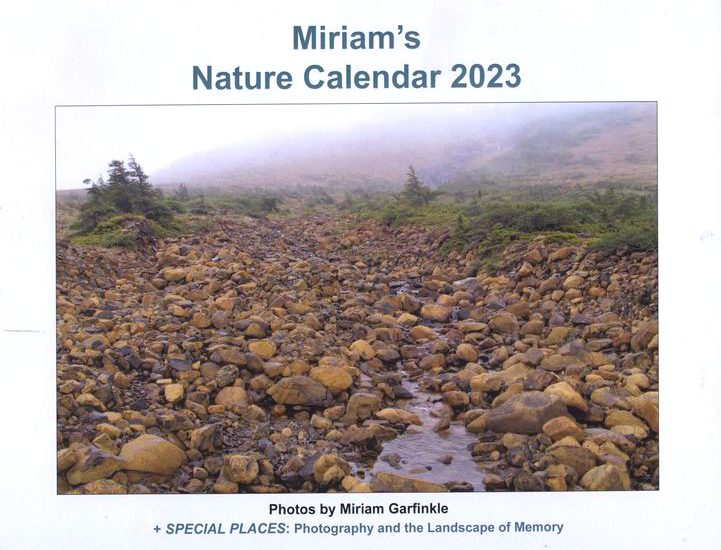
Nature Calendar January: Trumpeter Swan
January 1, 2023 - #
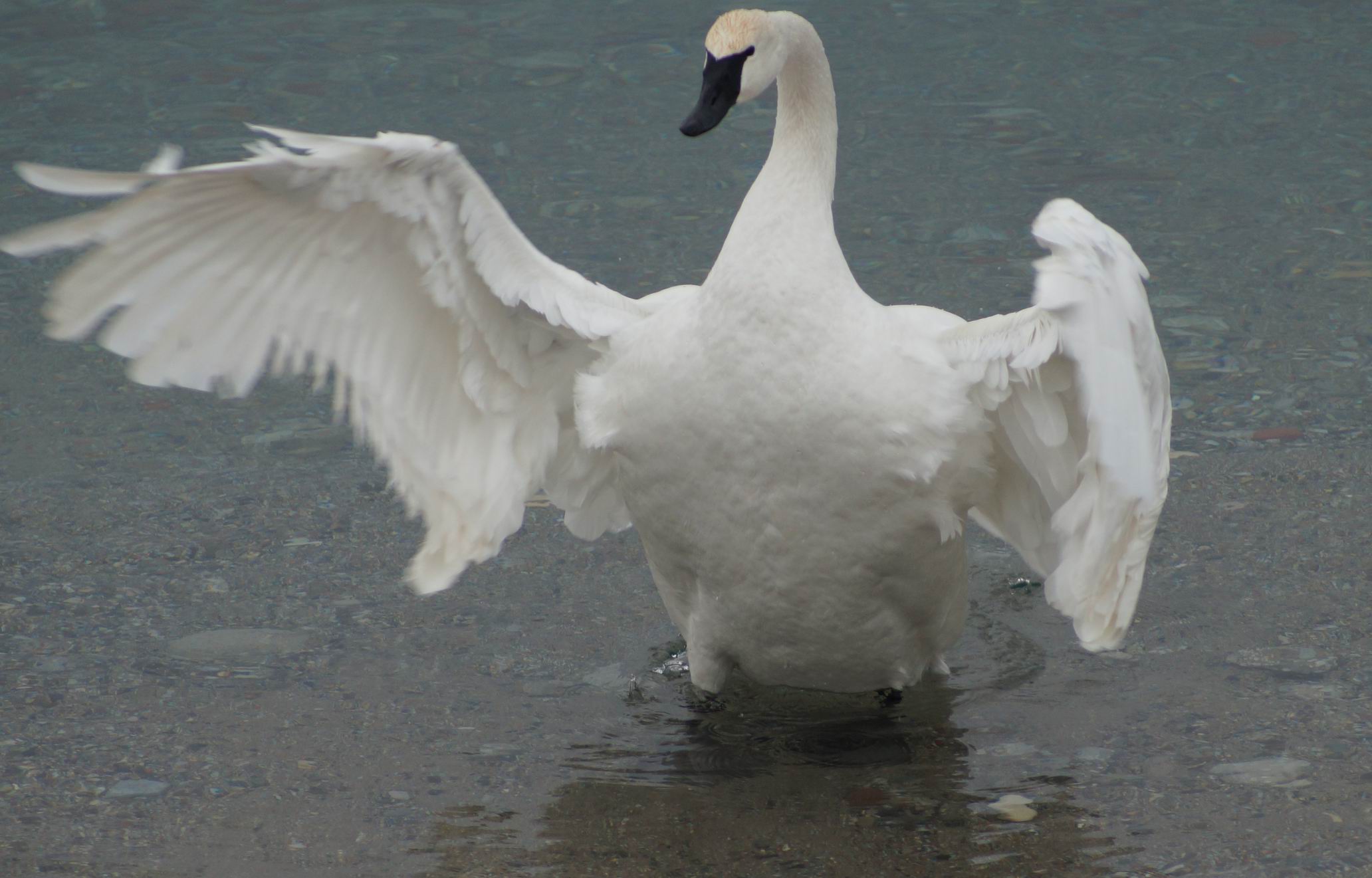
This is the January photo in the 2023 edition of Miriam’s Nature Calendar, featuring Miriam Garfinkle’s photos.
Trumpeter swans are impressive: the biggest wild birds in North America, and probably among the loudest. Driven to the edge of extinction in the 1800s, Trumpeters are slowly re-establishing themselves. At the Leslie Street Spit, where Miriam took this photo, they can be seen and heard even in mid-winter.
Nature Calendar March: Ring-billed Gull
March 1, 2023 - #
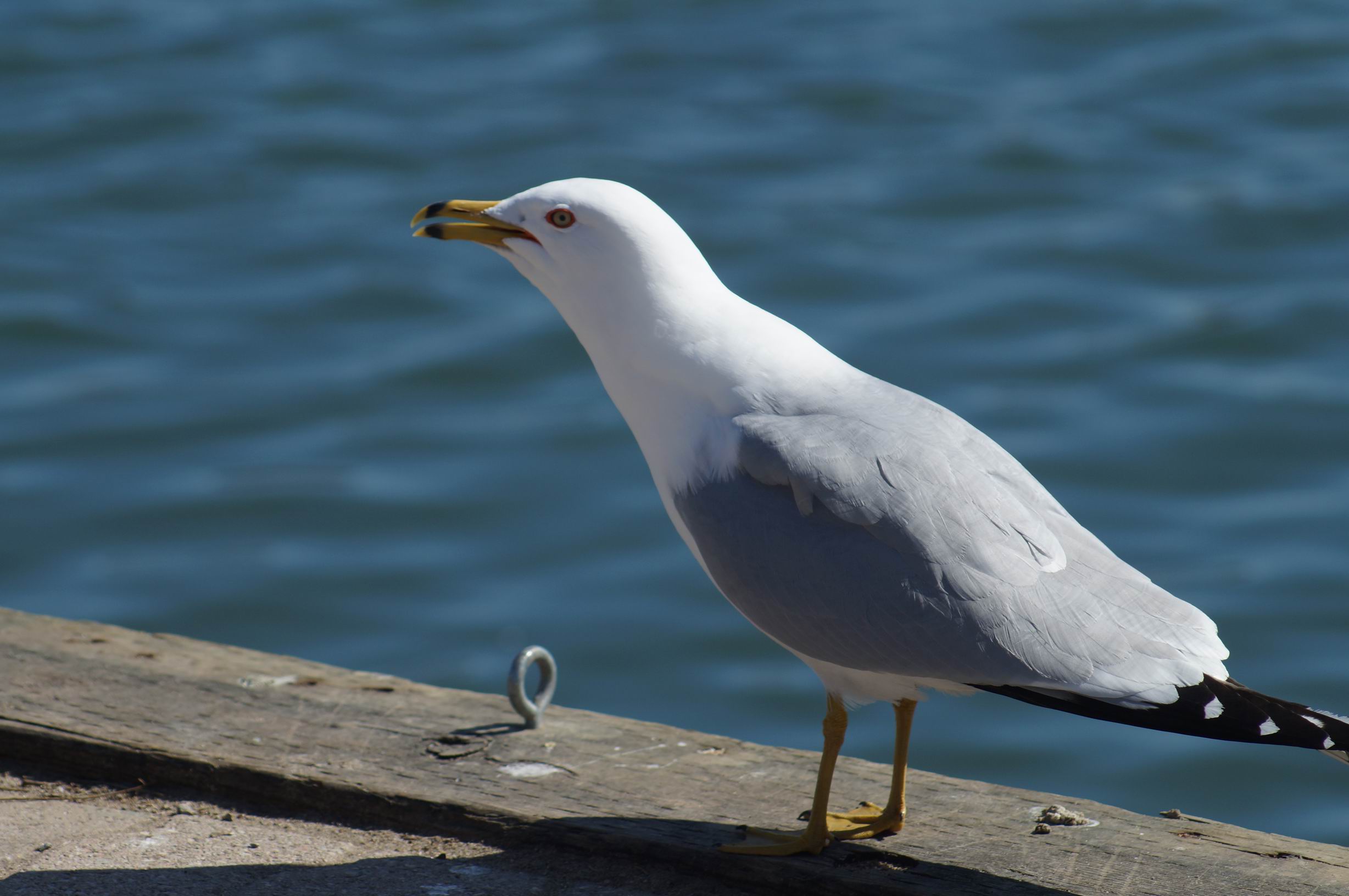
This is the March photo in the 2023 edition of Miriam’s Nature Calendar, featuring Miriam Garfinkle’s photos.
Ring-billed Gulls had virtually disappeared from the Great Lakes region by the beginning of the twentieth century. They started recolonizing the area around the 1920s, and have been expanding their numbers ever since. Superbly adapted to living with humans and appropriating their food, they now number in the millions.
Nature Calendar April: Red-winged Blackbird
April 1, 2023 - #
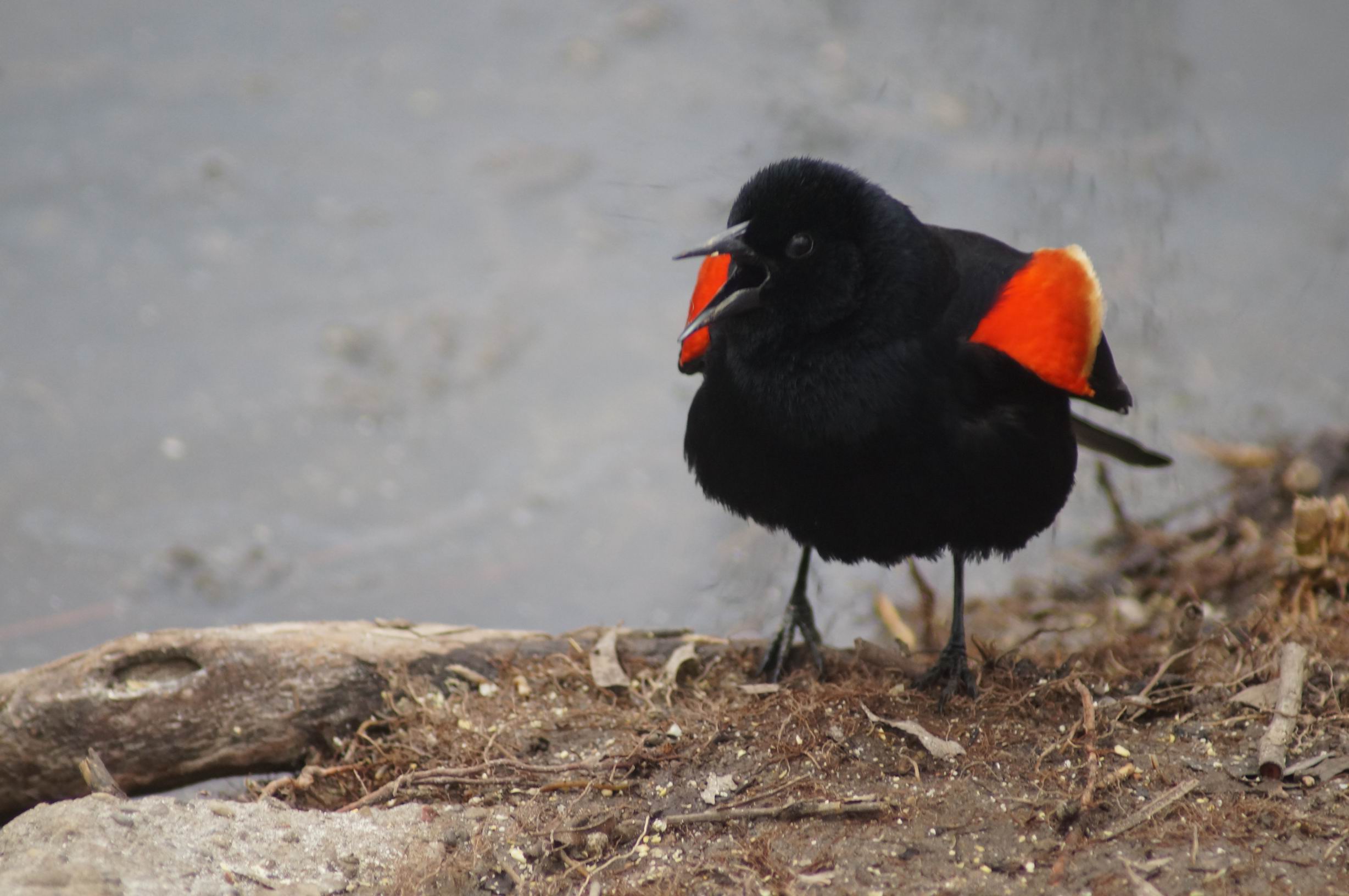
This is the April photo in the 2023 edition of Miriam’s Nature Calendar, featuring Miriam Garfinkle’s photos.
Male Red-winged Blackbirds use their bright red shoulder patches and their strident voices to lay claim to a breeding territory to which they will seek to attract one or more females. Miriam photographed this assertive specimen at the edge of Grenadier Pond on April 24, 2108, on one of our traditional birthday outings to High Park.
World Curlew Day 2023
April 21, 2023 - #
I have been producing a nature calendar (featuring my late partner Miriam Garfinkle’s nature photos) for the past five years. I include a miscellany of days that I think are worth noting, some of them political, many related to nature, and a few that might be considered slightly idiosyncratic, like World Chocolate Day (July 7) and International Beer Day (August 4).
April 21 is World Curlew Day. Curlews are wading birds with long bills, similar to Sandpipers. There are – or were – nine species of Curlew. Now, in all likelihood there are only eight species. The ninth species, the Eskimo Curlew, was at one time one of the most numerous shorebirds on the American continents, with a population in the millions. They shared the fate of the Passenger Pigeon, the Great Auk, and the Labrador Duck, which also thrived in large numbers until Europeans arrived. Eskimo Curlews were highly social, and that was a key element in their demise. They travelled in large flocks, making it easy for groups of hunters to shoot them. And shoot them. And shoot them. Not only that, but their instinct, when a member of the flock falls to the ground, is to swirl down to see what is wrong. Shoot one, and hundreds more will fly into shooting range.
There is still a small degree of ambiguity about the fate of the Eskimo Curlew. The last confirmed sighting was in 1963. Confirmed because the man who saw it shot it (of course), so there was a body to identify. Nevertheless there have been a few possible unconfirmed sightings since then. It’s possible a few still linger on somewhere, in the same way as a few Ivory-billed Woodpeckers are said to hang on in a swamp in Louisiana. The official status of the Eskimo Curlew is “Critically Endangered or Extinct.” If by some miracle you see one, you aren’t supposed to shoot it.
The Eskimo Curlew has a special place in Canadian literature. Fred Bodsworth’s book, Last of the Curlews (surely one of the few adult novels whose main character is a bird) was published in 1954. It became an enormous bestseller, selling more than three million copies, that at a time when Canada’s population was 18 million. At the time, it was apparently the best-selling Canadian book of all time. An animated film based on the book appeared in 1972.
The book tells the story of a lone male Curlew trying to find a mate. I don’t think it requires a spoiler alert to indicate how the story ends: after all, the book is called ‘Last of the Curlews.’
The photo below of the Eskimo Curlew was taken by Don Bleitz in 1962. It was the only time an Eskimo Curlew was ever photographed.
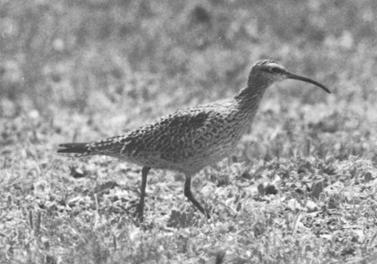
Related Reading:
Longing for freedom and grieving loss
Strange sounds up in the trees
The intelligence of ravens
White-throated Sparrow
Down at the lake
Red-tailed Hawk
Pigeons and People
Photography and the Landscape of Memory
Down by the lake this morning
April 28, 2023 - #
Down at Colonel Sam Smith Park this morning, I was surrounded by the sounds of Spring: Redwings proclaiming their territories, Grebes courting loudly, Canada Geese honking, a chorus of birds I couldn’t identify, and in the background, the waves crashing on shore.
I also noticed that there were swarms of insects hovering around me, which motivated me to go check out the field where the nesting boxes for Tree Swallows are located. They’re back! Swallows, lots of them, in the air, hawking for insects, and most of the boxes (several dozen in all) had a Tree Swallow sitting on top.
I don’t like to play favourites, and in any case my opinion changes from day to day, but today, at least, I think that Tree Swallows are the most beautiful birds in existence!
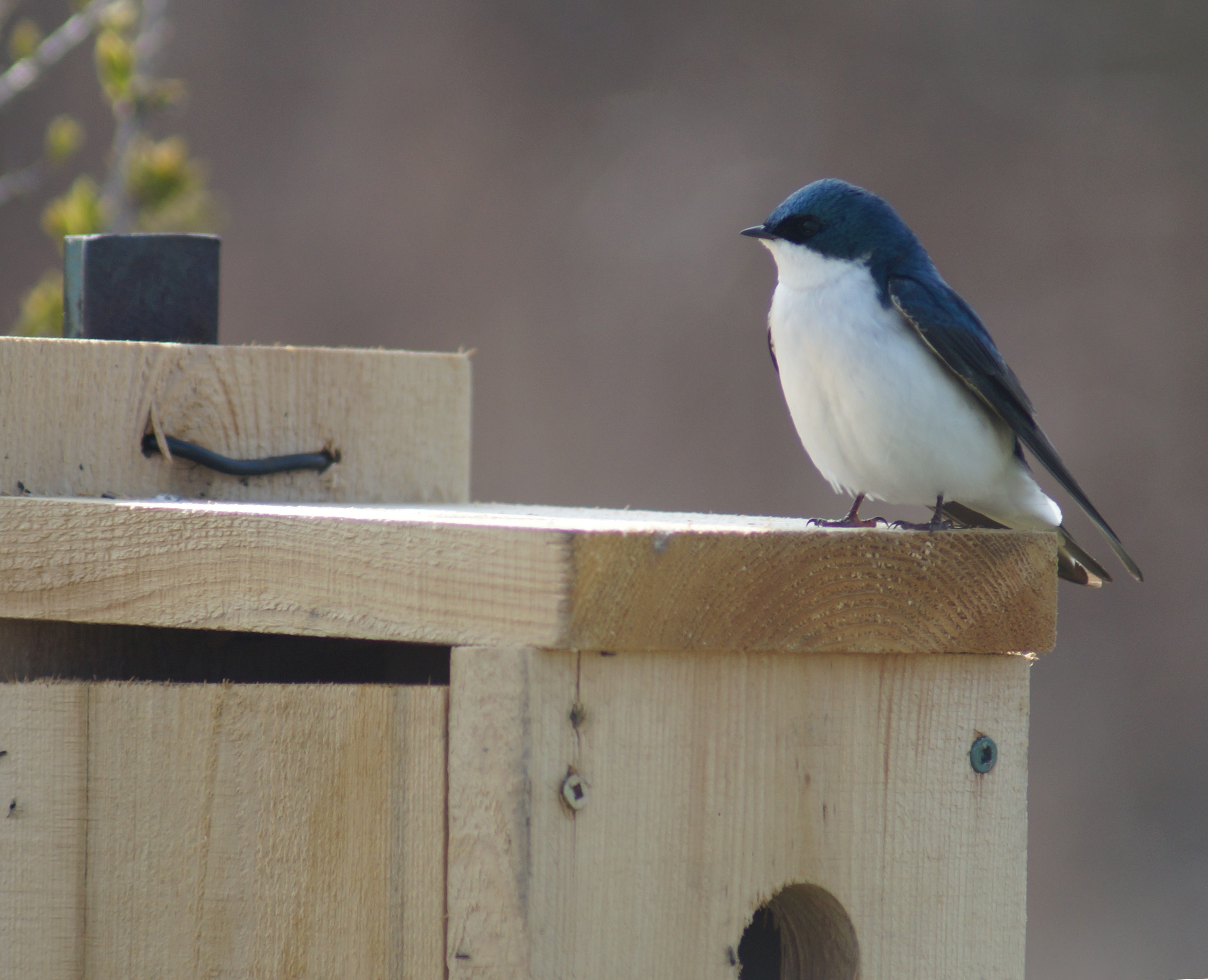
The many faces of Ulli Diemer, or, the uses of ‘artificial intelligence’
April 28, 2023 - #
It seems that everyone is talking about ChatGPT. I have seen a few essays generated by ChatGPT, and I can’t say I’m impressed. They read like something that an unambitious high school student hoping to scrape by with a ‘C’ might hurriedly cobble together the evening before an essay has to be handed in. The essay would be unlikely to receive that ‘C’ grade, however, because plagiarism is at the heart of ChatGPT’s output, and outright plagiarism – as opposed to unoriginal derivative thinking, which is commonplace – is still frowned on in educational settings.
The hype around ChatGPT got me thinking about other ‘intelligent’ applications that have been around for years, such as the Postmodernism Generator, which has been online since 2000, and in that time has delivered more than 33 million essays. There are also 500letters.org and artybollocks.com. All of them are way more fun, and way more original, than ChatGPT, so I asked all of them about myself. I’ve posted what they had to say about me below. You’ll see that I’m way more interesting than you may have thought. I particularly like the observation that my work is “saturated with obviousness, mental inertia, clichés and bad jokes.”
"How did you organize before the Internet?"
May 3, 2023 - #
Connexions is working on a project devoted to answering that question, and we’d like your help. We are looking for your recollections, stories, photos, and descriptions of your work, and we are also looking for samples of printed and other materials that you or your group produced.
We are hoping to produce, first, a feature for the Connexions website – www.connexions.org – that allows visitors to the website to explore and learn about the many different ways people on the left met the challenge of ‘getting the word out.’ We’re focusing especially on the “means of production” (of course!) and on the means of distribution, but we also want to pay attention to the political context and debates people were engaged in. Down the road we are hoping to pull together a physical exhibit, in collaboration one or more organizations which have a suitable space, displaying some of those means of production and the materials produced with them.
What we are looking for now is your memories. Written accounts would be great. Perhaps today is the day to sit down and describe the nitty-gritty of the behind-the-scenes work that went into all that political organizing. Maybe you’d like to sit down with your fountain pen, or your manual typewriter, and start recording those memories on paper. (Although we would actually prefer to receive digital files.)
We would also be happy to arrange an interview (phone or in-person) to add to Connexions’ collection of oral history interviews. Photos would be great too. And so would leaflets, posters, newsletters, etc. which we could scan and put online.
Our vision of the ‘Getting the Word Out’ project includes at least three dimensions: What, How, and Why.
The ‘What’ might include leaflets, posters, buttons, stickers, postcards, newsletters, newspapers, pamphlets, T-shirts, audio cassettes, guerilla theatre, songs, slogans and chants, and probably lots of other things we haven’t thought of.
The ‘How’ might include describing how we used our means of production, like that Underwood typewriter (with whiteout for correcting mistakes!), and later that IBM Selectric with the golf balls, that mimeograph or Letraset machine with its stencils and inks, the silk-screen and the photographic darkroom, the smaller bits of equipment like Xacto knives, waxers, border tapes, and blue pencils, and of course the condensed milk mixture for putting up posters.
We’d also like to hear about how the messages in those leaflets, newspapers, etc. were used to reach people: at workplaces, street corners, demonstrations, and wherever else you tried to engage people politically. Perhaps you remember phone trees, or the "Dial-a-Commie" answering machine?
As for the ‘Why,’ perhaps you might share some thoughts about the strategies you pursued, and to what extent they were successful. Did they bring us closer to the Revolution?
Don’t feel that you are being asked to produce a magnum opus. A quick sketch, even a paragraph or two, would be very welcome. Whatever works for you. We hope it might be fun to get some of those memories recorded.
If you have stories to tell, experiences to share, or questions, please contact us at Connexions. And please share this request with other people who might be interested.
Ulli Diemer
for the Connexions Archive
www.connexions.org
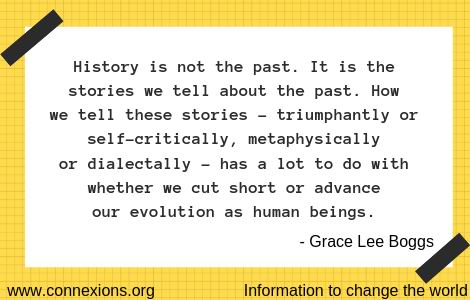
Our job is to oppose the U.S.-NATO Empire
October 8, 2023 - #
Last week, I posted some comments on Facebook about the war in Ukraine. There were a number of responses, some positive, some not. I have written about the war previously, for example here and here, and will no doubt do so again, but for now here are a few comments on my position:
The Main Enemy is at Home: My attitude derives from the left-Marxist position in the First World War. While most of the socialist left in most countries supported ‘their’ side in the inter-imperialist war, the radical left, which included people like Lenin, Luxemburg, and Liebknecht, and the socialist parties in Serbia and Bulgaria, took the position (as memorably articulated in Liebknecht’s slogan “The main enemy is at home!”) that the left should oppose their ‘own’ government and their ‘own’ side in the inter-imperialist war. It is worth noting that the Serbian socialist party took that position even though Austria had invaded Serbia.
My position is that the U.S.-NATO empire is the main enemy for those of us who live in that empire. That empire is far and away the main enemy of peace, and of working people, in the world today. I believe it is our responsibility to oppose our ‘own’ imperialists. It is the task of people in Russia to challenge their government.
Something that particularly disturbs me is the loose talk among pro-NATO cheerleaders about how ‘we’ should support Ukraine militarily. Who are ‘we,’ exactly? It is my impression that many of the people posting these comments are pensioners sitting in front of their computers thousands of miles away from the fighting, people who are extremely unlikely to join the Ukrainian army.
So then, who does ‘we’ really refer to? It refers to NATO, which is a tool of U.S. imperialism, and the source of limitless profits for the arms industry. It is a sad fact is that people who used to oppose NATO (at least until Yugoslavia/Kosovo in the late 1990s or Libya in 2011, when quite a few former leftists became supporters of imperialist interventions) are now full-on supporters of NATO. When they say ‘we’ they mean NATO, and the military-industrial complex in NATO countries.
What is also astonishing is that the people who take this position can support all-out NATO involvement in this war while simultaneously denying that this is a proxy war being waged by NATO.
And what does ‘support’ mean, exactly? One gets the impression that those who want to extend this military ‘support’ have fantasies about sending rifles to sturdy workers and farmers who will form people’s militias and go forth to confront the enemy – something like the Vietnamese fighting the Americans.
That is a fantasy. That is not what military support is.
‘Support’ means providing massive quantities of cluster munitions which will continuing killing people for decades. ‘Support’ means providing depleted uranium munitions which are guaranteed to cause birth defects and cancers in large numbers of children for generations. ‘Support’ means ballistic missiles. ‘Support’ means the U.S. military providing targeting information for missiles that strike targets inside Russia. ‘Support’ means encouraging reckless actions by NATO, actions that are acts of war under international law. ‘Support’ means an escalating risk of all-out nuclear war.
I wish the pro-NATO warmongers who are in favour of ‘military support‘ would be honest enough to come right out and say: “Yes, I think it is preferable that this war continues for years, at the cost of hundreds of thousands of casualties, rather than sit down to negotiate.” I wish they would be honest enough to admit, if only to themselves, that they think it’s better to risk nuclear winter, and the end of the world as we know it, rather than see a negotiated end to this war.
Related Reading:
The main enemy is at home (February 2022)
From Cold War I to Cold War II: A brief history
Is this how it all ends
Lurching to War
Our job is to oppose the U.S.-NATO Empire
War, Peace, and the Media
Russia-Ukraine Resources: History, context and analysis of the crisis
A bookstore moment
October 13, 2023 - #
When the world seems too much to handle, as it does these days, I sometimes seek solace in a bookstore.
So I went to Doug Miller Books just down the street from me today. “Looking for anything in particular?” he asks, as he usually does when customers come in. “Not really,” I say. “I probably shouldn’t even be here, since I have too many books already. I think it’s an addiction.” He smiles, because he approves of me having this addiction. I head off toward the back of the store.
A woman comes in a few minutes later. “Looking for anything in particular?“ Doug asks. “I want some books to decorate my bookshelf,” she says. “It doesn’t really matter what they are about. Well, I guess it does a bit.” Doug guides her to the shelf of military books. I’m not sure why there, but I presume he knows his business.
Me? I buy “Don’t Let’s Go to the Dogs Tonight” by Alexandra Fuller. It has a nice spine: Red, yellow, green, black, and white. I think it will look nice on my bookshelf.
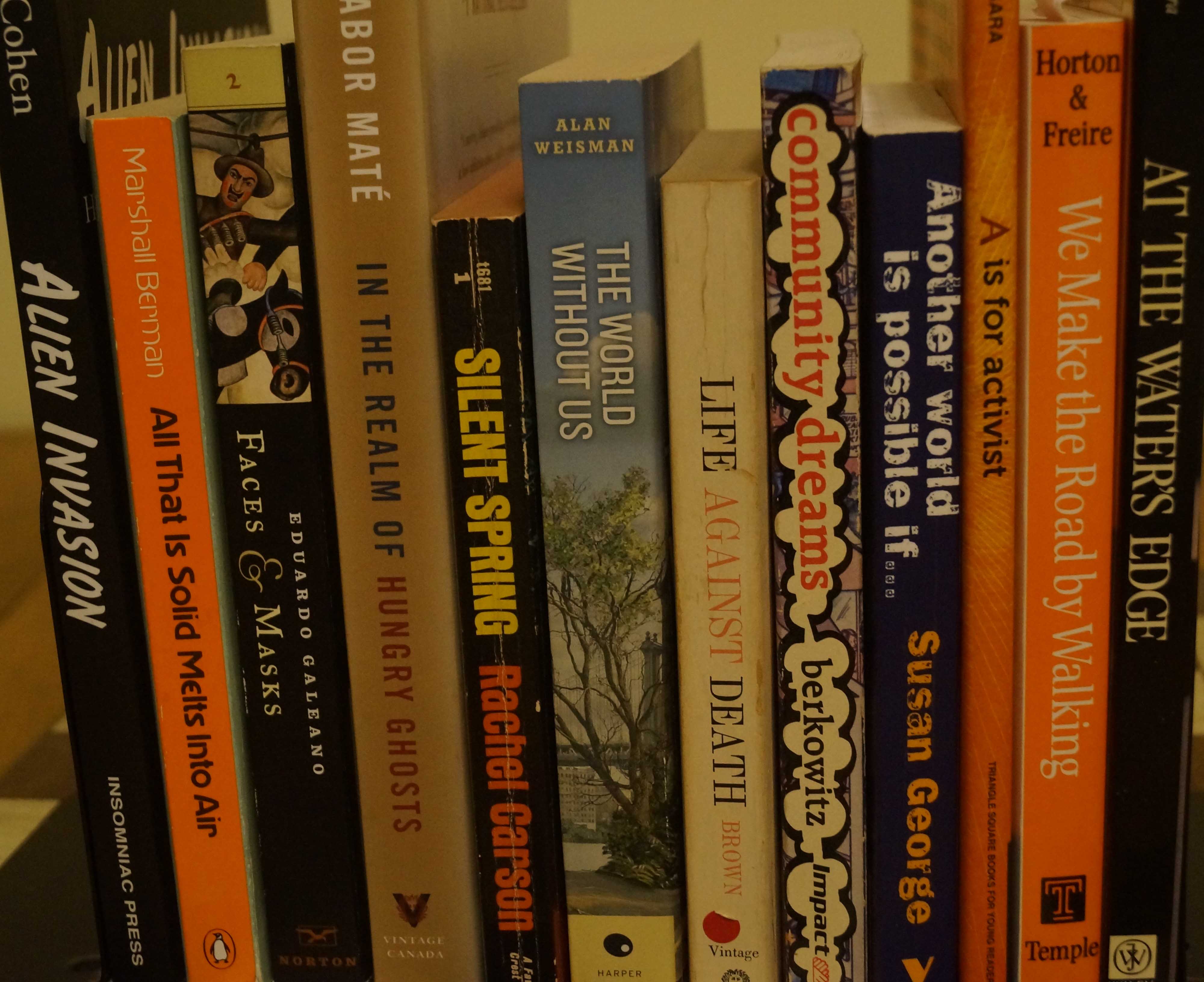
Fading to Silence? Other Voices, October 14, 2023
October 14, 2023 - #
The October 14, 2023 edition of Other Voices, the Connexions newsletter, which I edit, went out by email today. You can see it online here.
The theme of this issue is “Fading to Silence.”
The limits of permissible expression are shrinking dramatically. In the ‘Western’ world the illusions of liberal democracy and free speech still persist to a degree (albeit among a shrinking proportion of the population) thanks to the never-ending monologue of self-praise of the mass media and other institutions of narrative control.
A crucial element of maintaining the ‘necessary illusions’ of capitalist society, as Noam Chomsky and Edward Herman pointed out, consists of setting narrow boundaries for what can be discussed and then encouraging vigorous debate within those boundaries. We are free to argue about pronouns, bike lanes, and the future of the Toronto Maple Leafs. Commentators in the elite media can even debate whether ‘we’ ought to escalate the war against Russia, or whether ‘we’ ought to concentrate our efforts on preparing for war with China. (They are all agreed that ‘we’ should support Israel as it moves from mere ethnic cleansing to outright genocide.)
For a brief historical moment, the evolution of the Internet provided a means for people outside the mainstream to reach a wider public. Those who hold power saw that as a threat, and took action to throttle those unruly alternative channels. The most important step was privatization: the early Internet, anarchic and anti-commercial, was quickly taken over by corporations. Alternative voices were increasingly pushed to the fringes.
Fringe or not, some of those voices managed to expose misdeeds that were supposed to remain hidden. Nothing is worse than the crime of telling the truth, and those who commit that crime are pursued with unlimited vindictiveness, as people like Chelsea Manning and Julian Assange learned. In American ruling circles, the debate about what to do about Assange was between those who wanted to lock him up for life, and those who wanted to assassinate him.
More widely used, and highly effective on a broad scale, is the use of algorithms to strangle unwelcome voices. The major social media and search platforms have become extremely adept at disappearing alternative points of view simply by adjusting their algorithms. Over the past number of years, left-wing websites have witnessed dramatic drops in the number of people who visit their sites as the articles they publish disappear from search engine results and social media.
Read more....
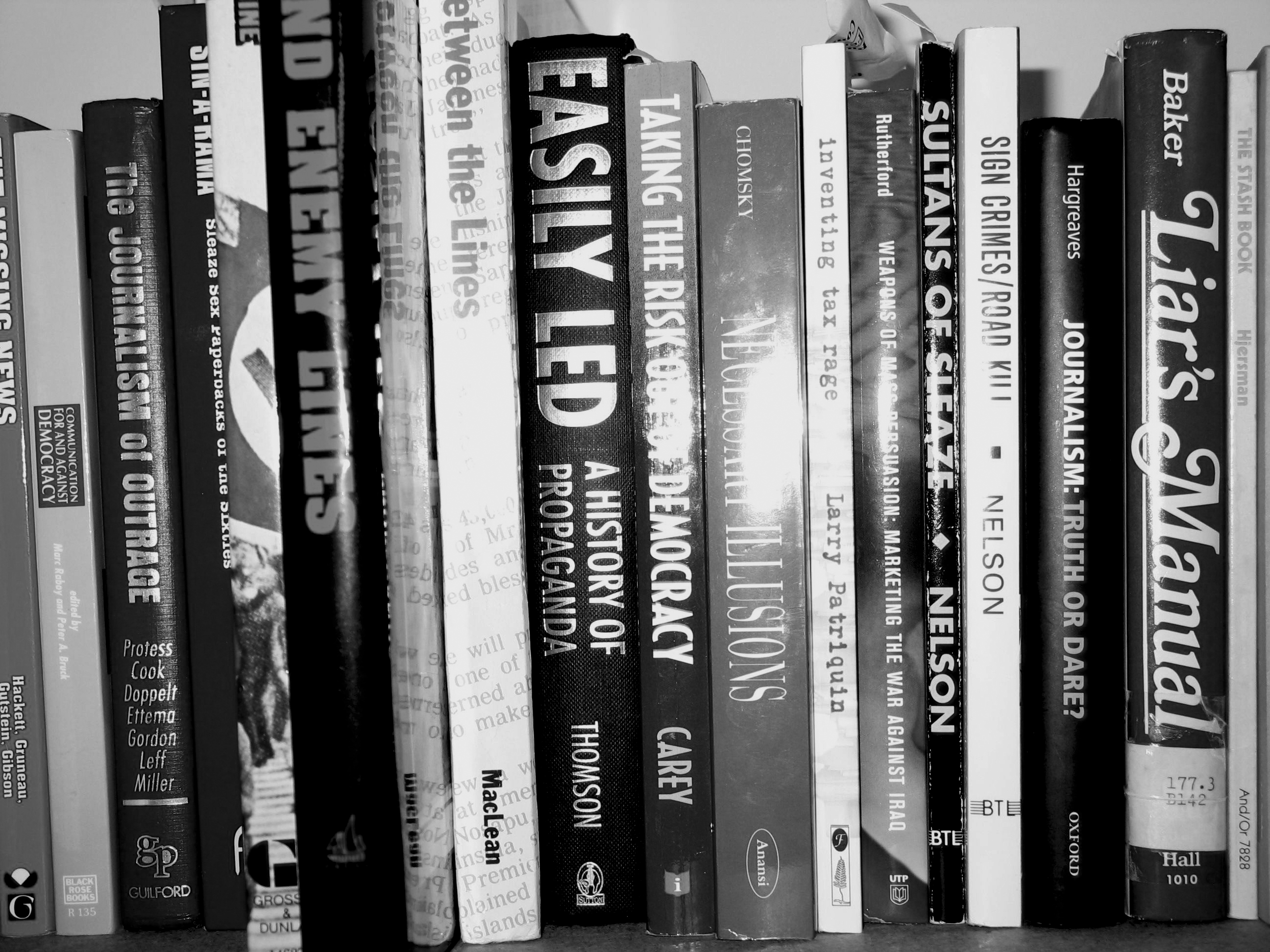
Gaza: Dehumanization and humanity
November 4, 2023 - #
The November 4, 2023 edition of Other Voices, the Connexions newsletter, which I edit, went out by email today. You can see it online here.
This issue is devoted to the ongoing horror of Israel’s genocidal attack on Gaza. I wrote the introduction, which appears below.
Gaza, O Gaza! What else could this newsletter be about except Gaza?
A hyper-militarized state, with a 75-year track record of ethnic cleansing, extreme violence, and violating international law with total impunity, is now crossing the final red line. We are witnessing genocide. How many dead will it take before the ‘international community’ intervenes? We already know the answer. Even when the United Nations General Assembly overwhelmingly votes for a ceasefire – a mere ceasefire, nothing more – the killing continues without pause, because there is no ‘international community’ – the only power than counts is the United States, with a few obedient client states, like Canada, trailing in its wake.
The more the killing goes on, the more eagerly Israel’s accomplices – among them, U.S. President Joe Biden, British Prime Minister Rishi Sunak, and, not wanting to be left out, Canada’s foreign minister Mélanie Joly – rush to Israel to genuflect and signal their approval of the slaughter.
Emboldened by these gestures of submission, Israel’s leaders continue to push even further, reassured that there is nothing, absolutely nothing, they won’t be permitted to do. An Israeli leader openly speaks of preparing a “Shoah” for the Palestinians. Shoah is not a word that slips out accidentally when an Israeli is speaking. They know what they are saying, and they mean what they say.
Others speak of bringing about a second Nakba, even more far-reaching than the Nakba of 1947. The Palestinians, they say, are “cockroaches” and “human animals.” The use of nerve gas against a civilian population is openly discussed among Israel’s military planners; the only objection raised is that it might accidentally kill Israeli soldiers as well. Questioned about the morality of bombing defenseless civilians, they point to Allied bombing in World War II. Dresden and Hiroshima were annihilated, they say: why should Israel settle for a lower body count? There are answers to that question, but they won’t come from politicians who are busy applauding mass murder.
What is there to say, except that we need to protest against governments that don’t speak for us? When governments and media do everything they can do dehumanize Palestinians, we are called on to remember the common bond of humanity that links us to Palestinians, and to act accordingly.
The mainstream media report on world events as if history started last week. Hamas’ break-out from the Gaza ghetto in which Israel has imprisoned the people of Gaza for the last 16 years, is reported as if it was inexplicable. The daily humiliations and restrictions imposed on Palestinians by the apartheid state that has ruled their lives for decades are ignored or brushed aside, as is the intensification of settler violence in the West Bank, where almost-daily pogroms are now a reality of Palestinians’ lives.
To provide some needed context, this issue of Other Voices looks at the history of Israel’s blockade and Israeli violence against Gaza, presenting articles that appeared on the Connexions website over the past 16 years. We hope they will help to counter the historical amnesia fostered by the mainstream media.
We also feature material which is concerned, not with violence, but with the rich cultural life of the people of Gaza. “Unprovoked Narratives” is an online collection of short films assembled by the Palestine Film Institute. Watching them reminds us, if we need reminding, that the people of Gaza are full of life and imagination. Watching them today is nonetheless painful, because almost certainly some of the people we see in these films will have been killed, or had family members killed, in the last three weeks. More will die in the weeks to come.
We are witnessing genocide. We need to act.
Ulli Diemer
Read more....
November 11
November 11, 2023
November 11. Remembrance Day. The day the Great War – now called the First World War – finally ended. The date has always been a significant one for me, first of all because it is my birthday, but also because the horrors of the war that ended on that day, and the even greater horrors that followed it, had a huge impact on my family, and therefore on me.
The guns fell silent on November 11, 1918, but reportedly many soldiers in the trenches feared that the armistice would prove to be temporary, and that fighting would shortly resume. In essence, they were right, even if there was a pause of a few years. The way the war was fought, and the way it ended, guaranteed that there would be another one, and that it would be even worse. Some historians argue that the First and Second World Wars were so closely linked that they were really one war, interrupted by a temporary armistice.
The First World War was an enormous crime perpetrated by Europe’s ruling classes: capitalists, landowners, aristocrats, and politicians. They expected, and indeed hoped, that a war would break out sooner or later, and they expected that they would benefit from it. Their visions were of profits, glory, and the conquest of territory and overseas colonies. None of them believed that their side would lose, and the loss of human life meant nothing to them. In addition, as historian Jacques R. Pauwels writes, “war was expected to serve as an antidote to social revolution, causing workers to abandon socialism’s focus on overthrowing the established order via international worker solidarity in favour of nationalism and militarism.” In other words, one of the benefits of war, in the eyes of the ruling classes, was that workers would be slaughtering each other rather than fighting their real enemies.
The fighting ended at 11:00 am on November 11, 1918: the famous eleventh hour of the eleventh day of the eleventh month, mentioned in reverential tones by sombre speakers at countless Remembrance Day ceremonies.
Official remembrances are often about forgetting as much as they are about remembering, and “Remembrance Day” is no exception. Why did the fighting end at 11 am on November 11?
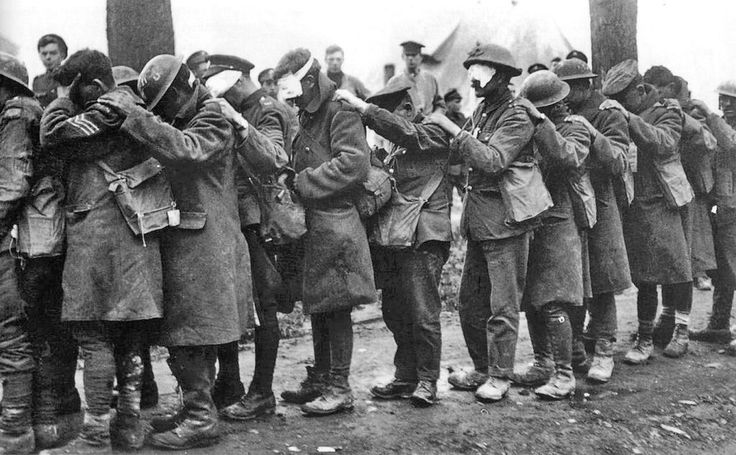
Soldiers blinded by mustard gas in World War I.
Toward the Light Other Voices, December 2, 2023
December 2, 2023 - #
The December 2, 2023 edition of Other Voices, the Connexions newsletter, which I edit, is now out. You can see it online here.
In the northern hemisphere, the approach of the Winter Solstice brings the darkest days of the year. This year, we are experiencing not only the long nights associated with the earth’s annual dance with the sun, but a deeper and more tragic darkness arising from the inhuman actions of some of our fellow humans. We live in a world where the most powerful states not only refuse to condemn genocide, but actively condone it.
The dark days of the Solstice have been a time of festivals and celebrations for thousands of years. Our ancestors knew that the darkness would be followed by the return of the light. The days would get longer, the icy days of winter would run their course, spring would come, plants would bloom. And so there were celebrations: Yule, Yalda Night, Dies Natalis Solis Invicti, Dongzhi, Inti Raymi, Saturnalia. The date for Christmas was chosen in part to align with existing Solstice festivals. The celebrations, whatever they called, were an occasion to come together and collectively assert our joy in knowing that the sun would return and bring with it the light that would nurture future life.
Most of us no longer celebrate the ancient festivals, but many of us – countless thousands – have been asserting our own desire and determination to create light in the darkness by going out into the streets and making our voices heard.
This issue of Other Voices looks at challenges we face, asks questions about what we should do, and looks to the past, as well as what is happening now, for ideas about how to move forward.
You can find the newsletter here....
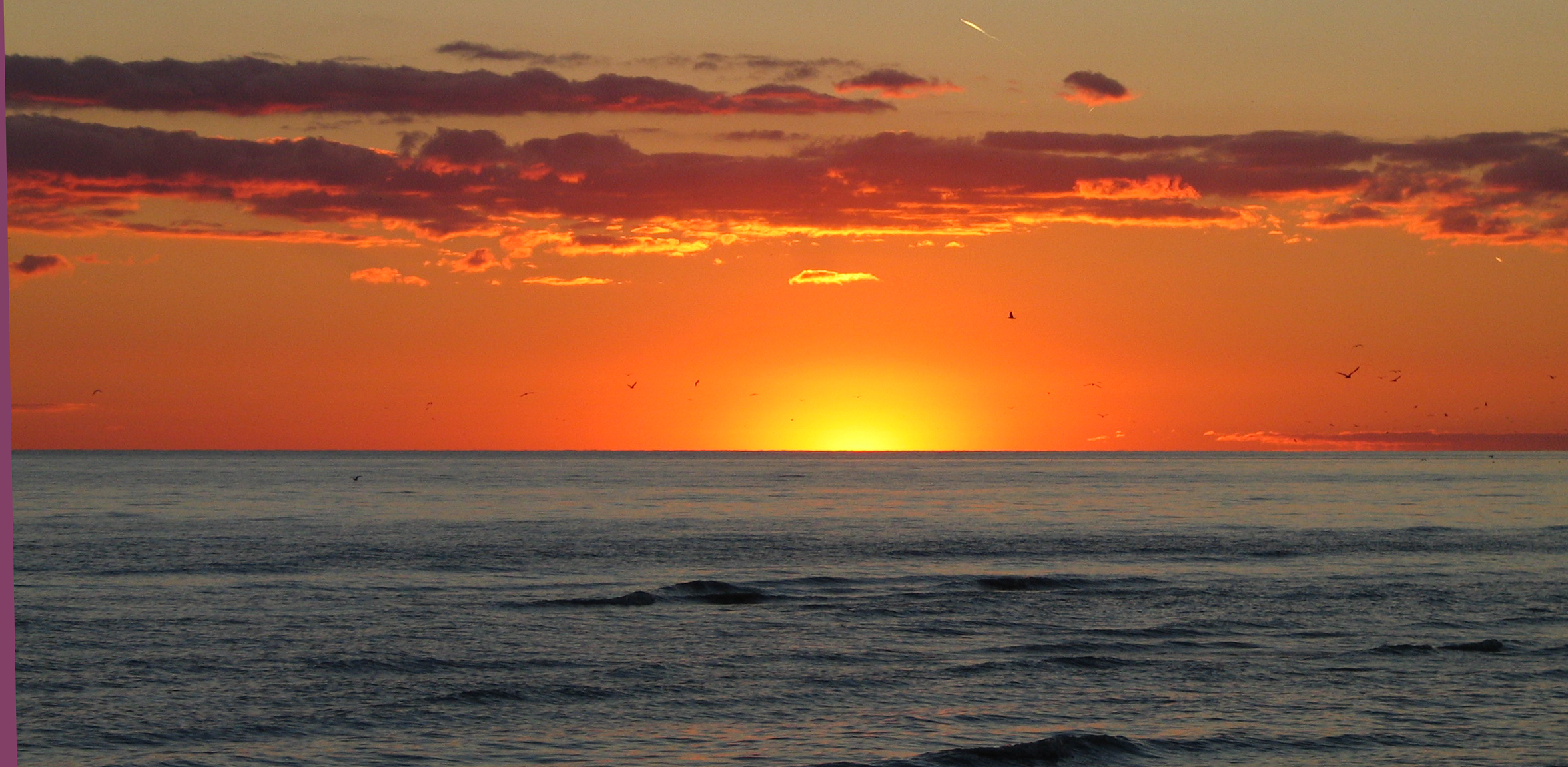
Covered Bridge
March 2, 2024 - #
It feels tone-deaf to worry about small local misfortunes it the midst of a genocide. So I have mixed feelings about even mentioning the fact that the Covered Bridge Potato Chip plant near Hartland, New Brunswick burned down this morning. It’s completely destroyed.
The people who worked there are out of a job – but alive! – and I will no longer be able to buy my favourite potato chips. But I can buy as much food as I want, anytime I want, and no one will kill me while I’m attempting to do so, unlike the more than 100 people who were massacred by the Israeli military a couple of days ago while waiting to get desperately needed food from food aid trucks.
Meanwhile, the Saint John River continues to flow under the covered bridge in Hartland, a place that holds special memories for me. I think that matters too, even in a time of genocide.
The photo is of the Saint John (Wolastoq) River near Hartland.

Other Voices, March 3, 2024
March 3, 2024 - #
The March 3, 2024 edition of Other Voices, the Connexions newsletter, which I edit, is now out. You can see it online here. I wrote an introduction to the issue; it appears below:
Drowning in a Sea of Lies
There are other words for it, of course. Narrative Control. Message Management. PR. Framing. Spin. Disinformation. Media Bias. Hasbara. Corporate Communications. Mainstream Journalism. Propaganda.
But plainly put, it’s Lies, Lies, and more Lies. Lies are the lifeblood of the world we live in. The American-dominated international order is rooted in violence and exploitation, but lies are its language, its public face, and its spiritual essence.
The American novelist Mary McCarthy once said, [of someone who supported Stalin’s show trials] “Every word she writes is a lie, including ‘and’ and ‘the’.”
She might well have been speaking of today’s mainstream media, both its corporate-owned and state-funded varieties. What McCarthy was saying was not, of course, that literally every word was a lie in and of itself, but that even factual statements become part of a lie when they are included in a story whose main premise a flagrant lie. Spelling a prisoner’s name correctly, and getting the date of their execution right, is irrelevant when the story falsely says that they were guilty of a crime they didn’t commit. Faux-accuracy around minor details merely adds an aura of credibility to the lies being peddled as truth.
The most effective purveyors of lies are precisely the ‘quality’ media, like the New York Times, the Washington Post, the Globe and Mail, Associated Press, the BBC, CNN, and the CBC, which are at pains to foster the illusion that they are committed upholding the highest journalistic standards. When it comes to covering stories in which the interests of the Empire are not at stake, they can indeed often be relied on to present a relatively accurate version of the facts. If the Toronto Star or the CBC tell you that a truck full of cabbages overturned and spilled its contents, you can assume, with a high degree of probability, that there were in fact cabbages rolling on the highway.
If they tell you that the U.S. is bombing some country to enforce the ‘rules-based international order,’ you can take it as a certainty that they are lying. Not lying about the bombing – the U.S. bombs some country or other pretty much every day of the year; what would be really newsworthy would be a day on which they didn’t bomb anybody – but lying about the reason for the bombing.
The very phrase ‘rules-based international order’ is an example of a lie concocted to mislead the public. It was invented as an alternative to ‘international law’ to draw attention away from the inconvenient fact that the U.S. and its NATO allies constantly violate international law. The purely ideological and content-less concept of ‘rules-based international order’ was invented to sound good while disguising the fact that there are no rules except those imposed by the United States. The essence of the ‘rules-based international order’ can be stated in three words: ‘Obey or Die.’
In fact, the true meaning of all the empty phrases about ‘democratic values’ and ‘human rights’ and ‘freedom’ and the ‘rule of law’ can now be summarized in one word: Gaza.
In Gaza, the world watches as day after day, the Israeli Defence Force, the army that even now obscenely proclaims itself ‘the most moral army in the world,’ commits genocide. And Israel’s allies – more accurately, its accomplices in mass murder – ship weapons and money to Israel, and block attempts in the United Nations to stop the killing.
Among the accomplices in this genocide are the ‘mainstream’ media who continue to spin lies and defend the indefensible. Still, it is important to point out that there are journalists who are working, at great personal risk, to report what is really going on. Many have paid with their lives, because Israel, as it has always done, deliberately targets journalists for killing. CNN’s pro-Israel, pro-genocide coverage has been so horrible that CNN journalists are posting anonymous reports on social media to refute CNN’s lies and distortions. The mainstream media are very bad, but not everyone who works there is bad.
Still, the bottom line is that the mainstream media are purveyors of poison. There is a case to be made for avoiding them as much as possible, and getting one’s news from alternative media websites and trusted individual commentators. They are out there. Some are listed in this newsletter, others can be find via the Alternative Media List on the Connexions website. Bookmark the sites you find valuable in your browser. Sign up for their mailing lists; they’ll send you an email when they publish something new.
Spring is coming. If you are still consuming unhealthy quantities of the mainstream media’s toxic offerings, perhaps it’s time to turn over a new leaf.
Ulli Diemer
March 1, 2023
Yes to life – in spite of everything
Children and Israel’s war on Gaza
Other Voices, May 25, 2024
May 25, 2024 - #
The May 25, 2024 edition of Other Voices, the Connexions newsletter,
which I edit, is now out. You can see it online here.
I wrote an introduction to the issue; it appears below:
Yes to life – in spite of everything
Children and Israel’s war on Gaza 2006 – 2024
For most of us
our natural instinct
is to protect children
nurture them
teach them
answer their questions
help them understand
help them find their way.
But sometimes we can’t protect them
And we have no answers
to their questions.
We can’t explain why this is happening
or why the world is letting it go on.
In terrible times,
sometimes children are the ones
who teach us.
By what they do
instinctively.
What they teach us through their actions is
to keep living
to keep living
to say yes to life.
Yes to life – in spite of everything.
Read the newsletter here.
Other Voices, October 2024: Everything is under control. Until it isn’t.
October 5, 2024 - #
The October 2024 issue of Other Voices, the Connexions newsletter, which I edit, is now out. You can see it online here. I wrote an introduction to the issue; it appears below:
Everything is under control. Until it isn’t.
October 27, 1962. We’ve gone close to the brink more times than most of us realize, but October 27, 1962 was the day the world we know almost came to an end. On that day, in the midst of the Cuban Missile Crisis, the world was seconds away from all-out nuclear war.
The Cuban Missile Crisis arose out of a series of strategic calculations which made sense to military and political planners on both sides. In the nuclear age, a miscalculation can result in unspeakable catastrophe, but nonetheless, decision-makers continue to take risky actions which they calculate will bring them an advantage. They assume that they can to push forward and ‘show strength’ and then push some more, while reserving the option of showing restraint if the other side pushes back too vigorously.
The American side has always been the more aggressive. In the early 1960s this aggression manifested itself, among other things, in a failed invasion of Cuba intended to overthrow Cuba’s left-wing government, and then in the placement of American nuclear missiles in Turkey, right on the borders of the Soviet Union itself. The Soviets regarded these missiles as intolerable because they potentially gave the Americans the capacity to launch a first strike nuclear attack on the Soviet Union. A first strike has always been an option which American military planners have regarded as a possibility to consider: a devastating surprise attack which would eliminate most of the Soviets’ (or now, Russians’) ability to strike back.
The Soviets responded to the placement of American nuclear missiles in Turkey by placing its own missiles in Cuba. The U.S. reacted very aggressively. They imposed a naval blockade on Cuba (illegal under international law) and threatened to bomb and invade Cuba if the missiles were not removed. For several days, the world teetered on the brink. People went to bed not knowing if they would still be alive in the morning.
The crisis reached its climax on October 27, when the U.S. detected a Soviet submarine, the B-59, in international waters near Cuba. The commander of an American warship in the area, who may have been acting without authorization from his military superiors, decided to drop depth charges on the Soviet submarine. This was an outright act of war. More than that, an attack on the other country’s nuclear forces was understood to be the gravest possible provocation, a step that would be taken only if a nuclear war was being launched.
There is often an element of chance in crises, and in this crisis an unforeseen circumstance was that the B-59 had suffered technical problems which had put its communications system out of commission. The commanders of the submarine could not contact Moscow for orders, and had no way of knowing what was going on elsewhere. Had war in fact broken out, or was the American attack on their ship the action of a rogue officer acting without orders?
If war had broken out, as the attack on their ship seemed to indicate, the Soviet submarines’ orders were to launch their nuclear missiles against American targets. In a situation such as this one, where they were unable to contact their military command, the decision was left up to the commanders of the ship. Recognizing the gravity and irrevocable nature of a decision to launch nuclear missiles, the protocol was that the captain of the submarine, and the two senior officers on board, had to unanimously agree to fire their missiles.
The captain of the B-59, Valentin Grigoryevich Savitsky, decided that it was probable that a nuclear war had already started, and wanted to give the order to launch. Political Officer Ivan Semyonovich Maslennikov agreed. The other senior officer, Vasily Aleksandrovich Arkhipov, said no. There was a furious argument among the three men, but Arkhipov held firm, and eventually persuaded the captain to surface and await orders from Moscow. It turned out that war had not broken out. If the B-59 had launched its missiles, however, there would have been a nuclear war between the Soviet Union and the United States. Hundreds of millions would have died.
The next day, realizing that events were spiralling out of control, U.S. President Kennedy and Soviet leader Nikita Khrushchev came to an agreement to end the crisis: The Soviets would remove their missiles from Cuba, and the U.S. would remove their missiles from Turkey.
There would be no war – this time. Because one man, Vasily Aleksandrovich Arkhipov, said no.
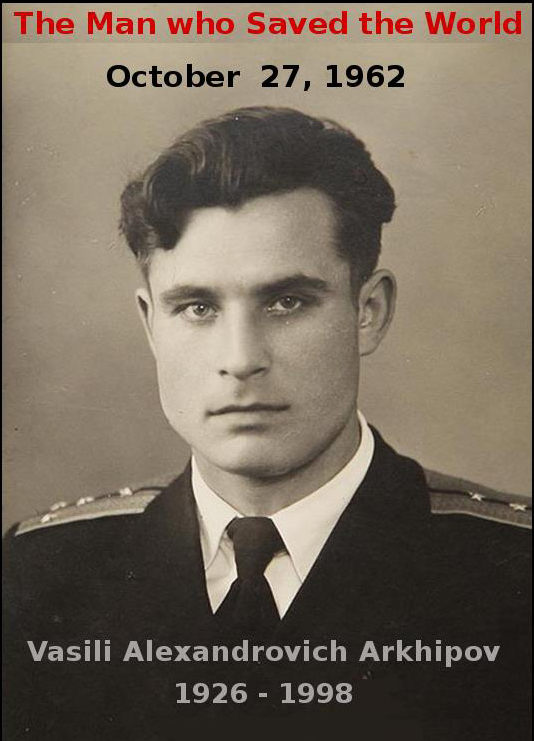
The world now finds itself in probably the most dangerous situation since the Cuban Missile Crisis.
In the Middle East, the danger of a major war which will devastate much of the region, with incalculable human and environmental costs, is increasing by the day. In Israel, the Netanyahu regime seems to have decided that, not a peaceful settlement, but an all-out regional war which will bring in the United States, is its best strategic option. There are voices in Israel’s military and security apparatus who are warning against the enormous risks this entails, but it seems they are not being listened to.
The greatest danger to the entire planet, the potential flashpoint which could lead to a nuclear war, is in Ukraine. The US/NATO alliance has a long record of pushing, pushing, pushing against Russia. When Russia warns of red lines which will lead to serious retaliation, they pause briefly, instruct their Ukrainian proxy to hold off, but not long after, the pushing, the testing of Russia’s limits, starts again. American spyplanes and satellites provide targeting information for Ukrainian missiles striking Russia. American warplanes buzz Russia’s borders. Ukraine mounts attacks, fortunately so far unsuccessful, against nuclear power plants. Ukraine has even attempted to attack an early warning station which would warn Russia of a nuclear attack: an act of sheer madness, since an attack on such an installation would be the first step in a nuclear attack on Russia, and would therefore be probable grounds for Russia to launch its nuclear missiles.
It has been clear for some time that Ukraine cannot win this war, but as it has from the beginning, the United States and its NATO allies continue to insist that Ukraine keep waging war rather than make peace, no matter what the cost in human lives. Their goal is to hurt Russia, no matter how many Ukrainians (and Russians) are killed or injured. Zelensky’s increasingly isolated, authoritarian, and desperate regime, for its part, has come to believe that the only way it can salvage something from this war is to get the Americans directly involved in the fighting. So far, the U.S. has sought to avoid going too far, well aware than a direct American attack on Russia would almost certainly lead to a direct Russian attack on the United States. But at the same time, American decision-makers disdain diplomacy: the only language they know is that of power politics. That is a recipe for disaster, sooner or later.
All it will take is one misstep, one miscalculation, one reckless action by a mid-level military officer acting without orders – and the missiles will start flying. And it will be game over for the human race.
In 1962, humanity survived because one man, Vasily Aleksandrovich Arkhipov, said no, and because John F. Kennedy and Nikita Khrushchev were rational enough to realize that things had gone too far and that they had to compromise. We have to hope that there are enough shreds of sanity among those in power today to once again avoid disaster.
This Moment — Other Voices, November 9, 2024
November 9, 2024 - #
The November 9, 2024 edition of Other Voices, the Connexions newsletter, which I edit, is now out. You can see it online here.
This issue takes its theme from Anne Frank, who wrote:
“How wonderful it is that nobody need wait a single moment before starting to improve the world.”
In discouraging times, those of us who have been working to improve the world need to try to remember that this is the moment when we need to keep trying, despite the odds.
Two other quotes from Anne Frank set the tone of the newsletter:
“I’ve found that there is always some beauty left – in nature, sunshine, freedom, in yourself; these can all help you.”
It’s really a wonder that I haven’t dropped all my ideals, because they seem so absurd and impossible to carry out. Yet I keep them, because in spite of everything, I still believe that people are really good at heart.”
Previous: Notebook 9 — Next: Notebook 11